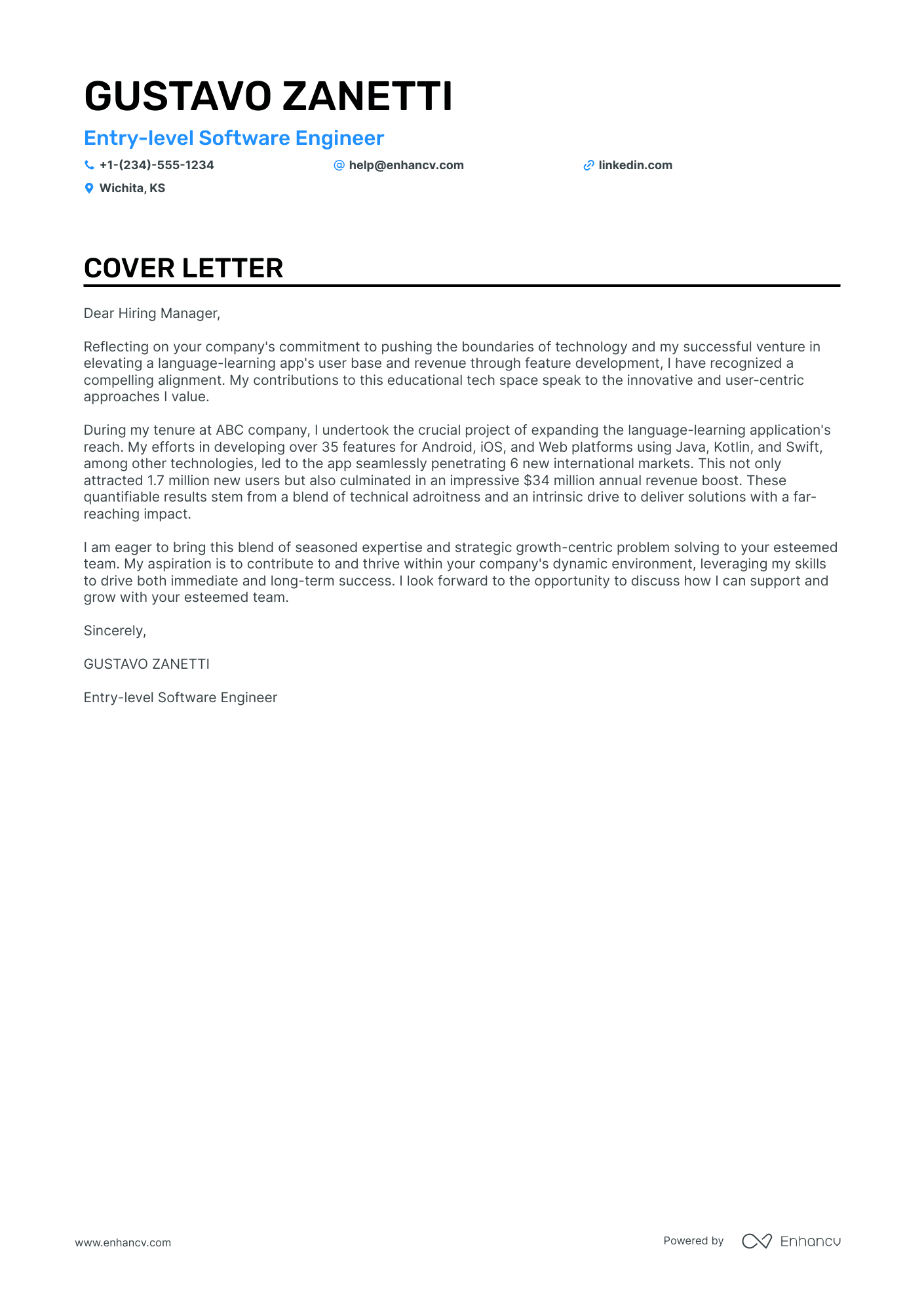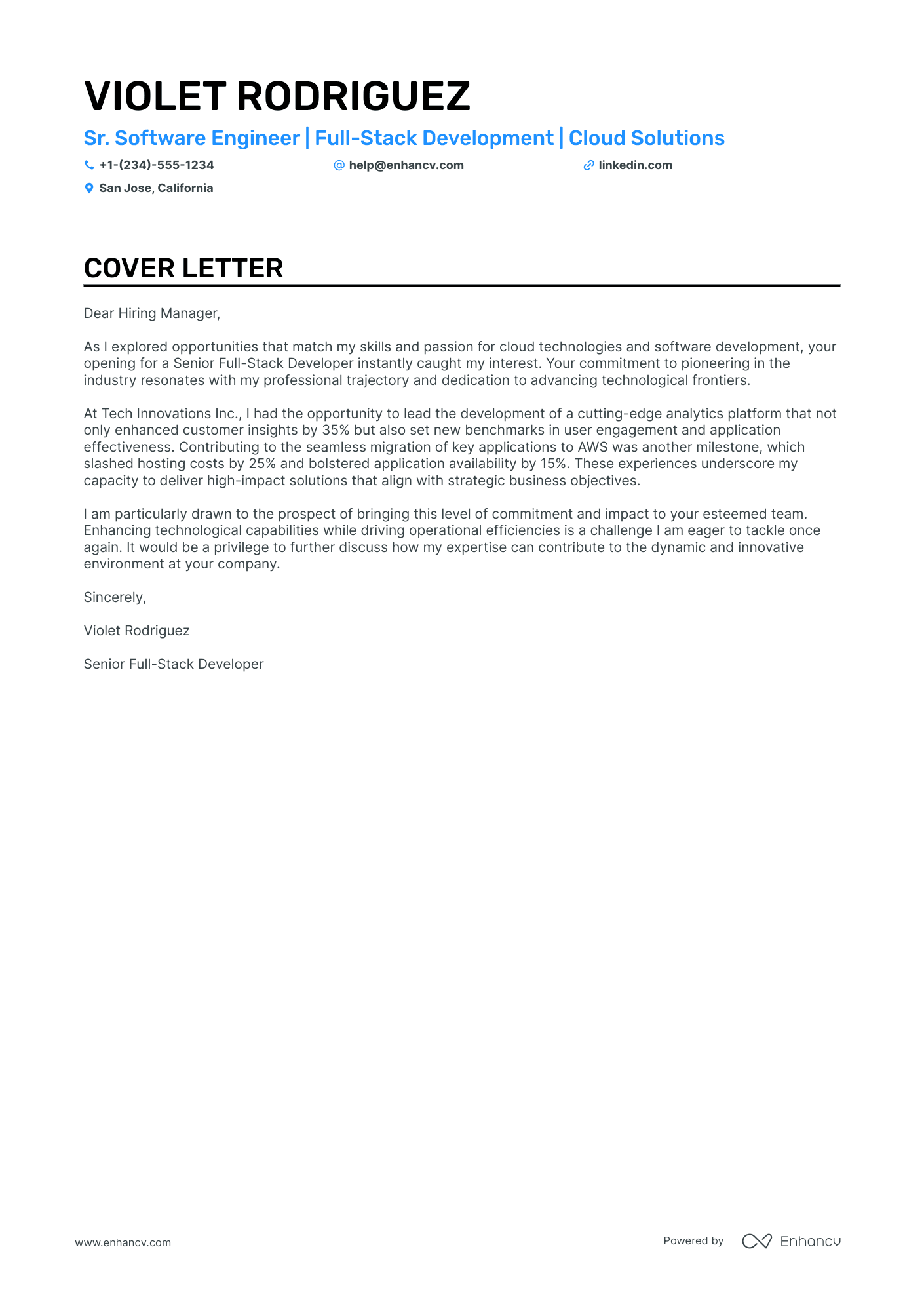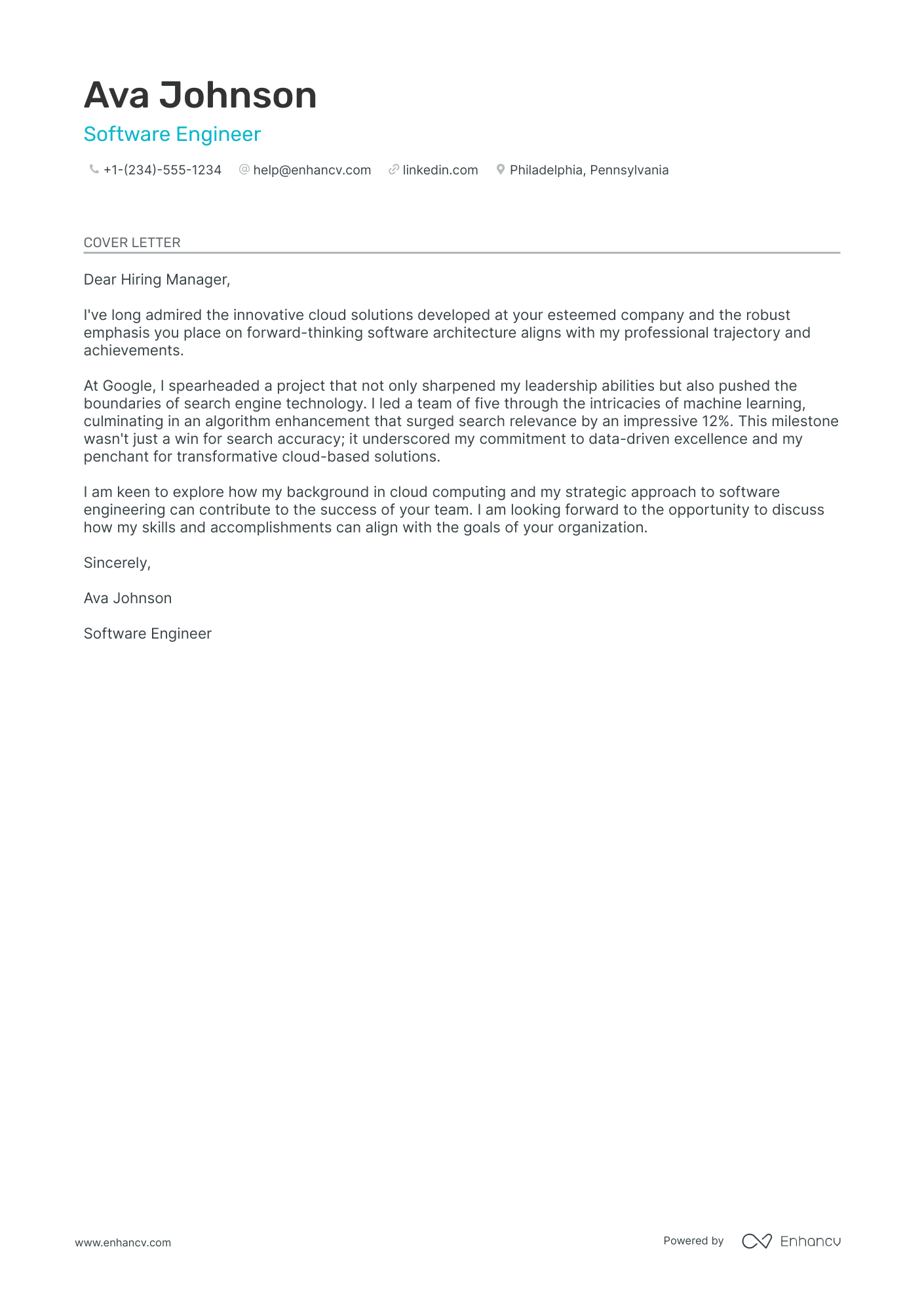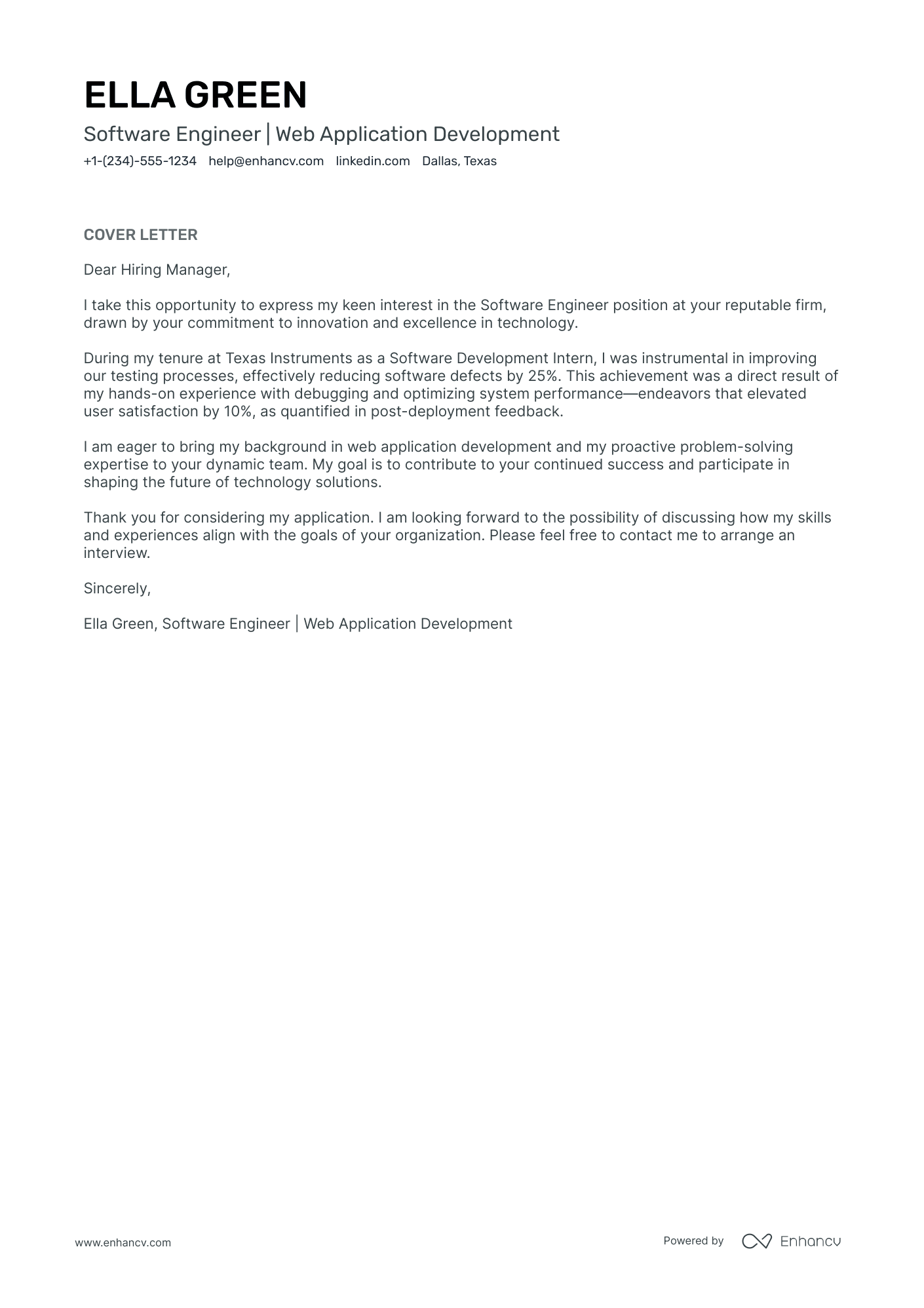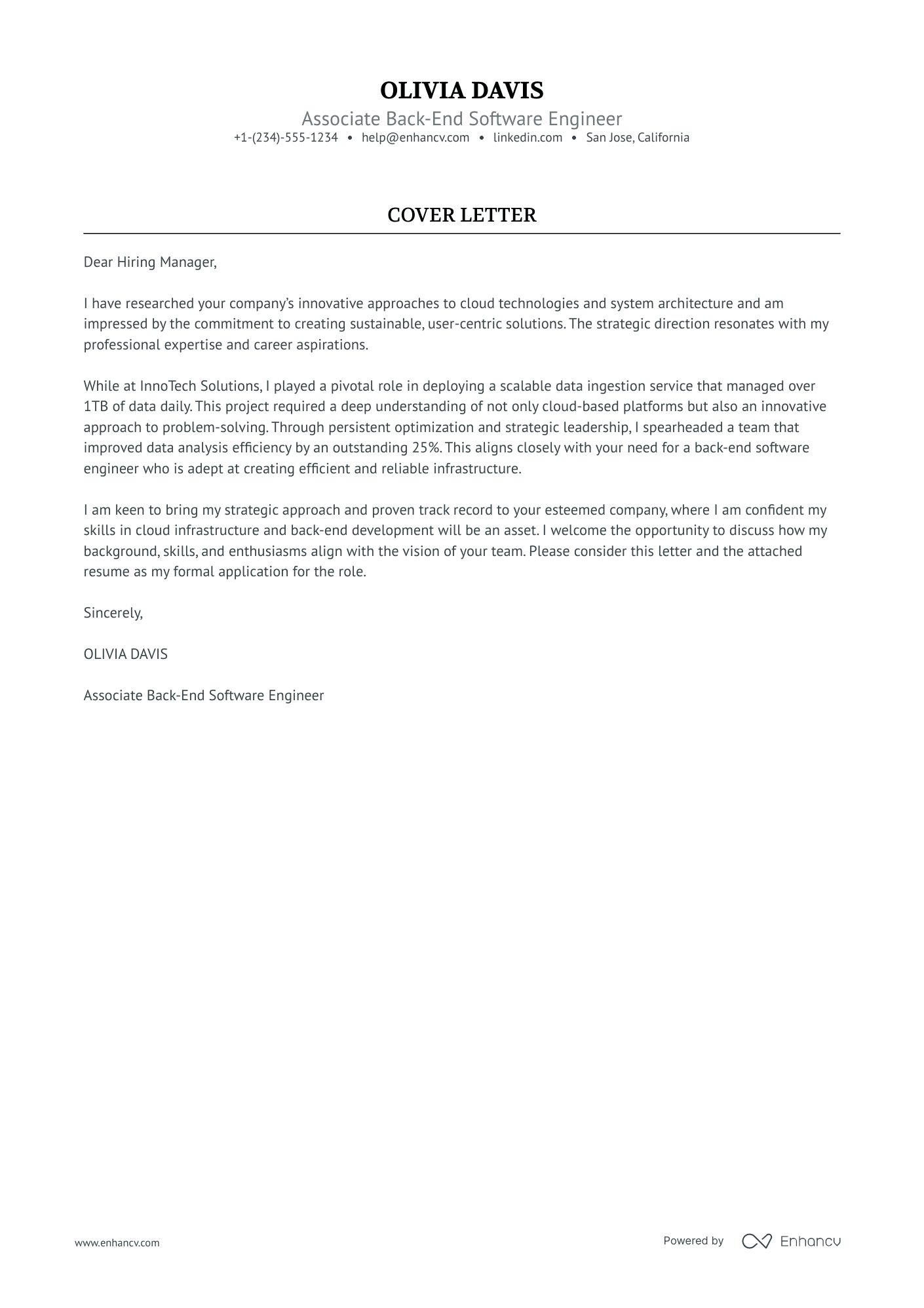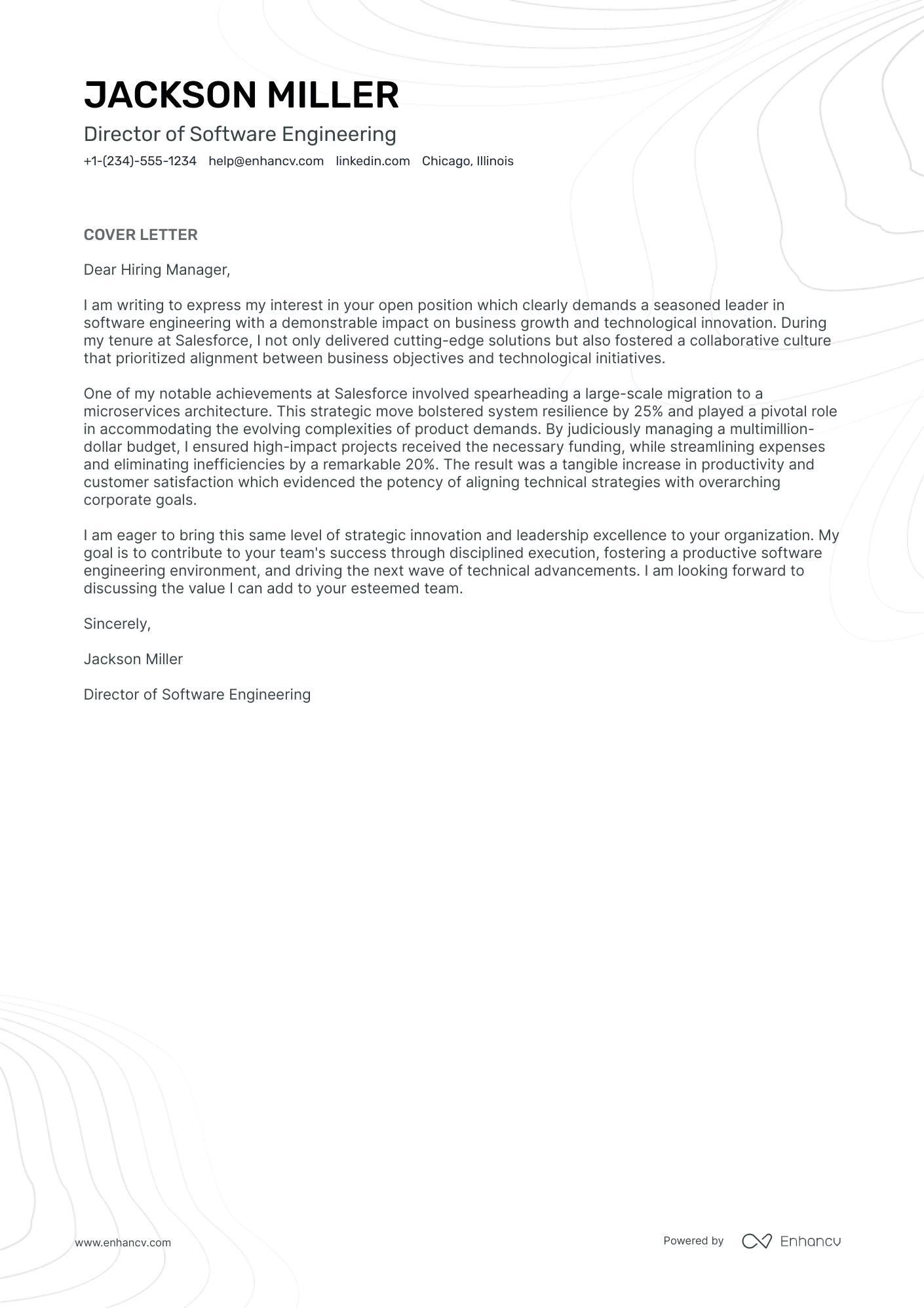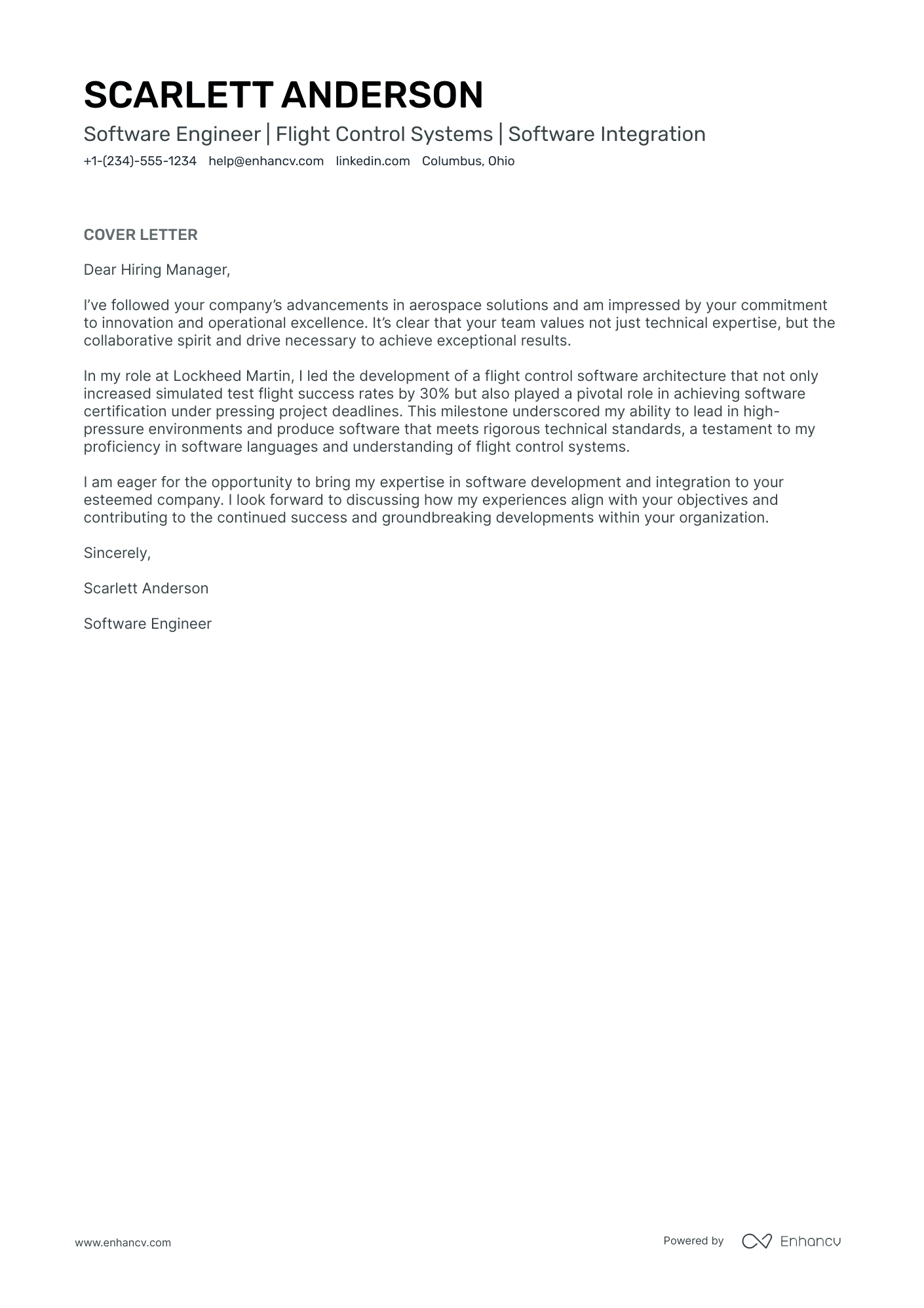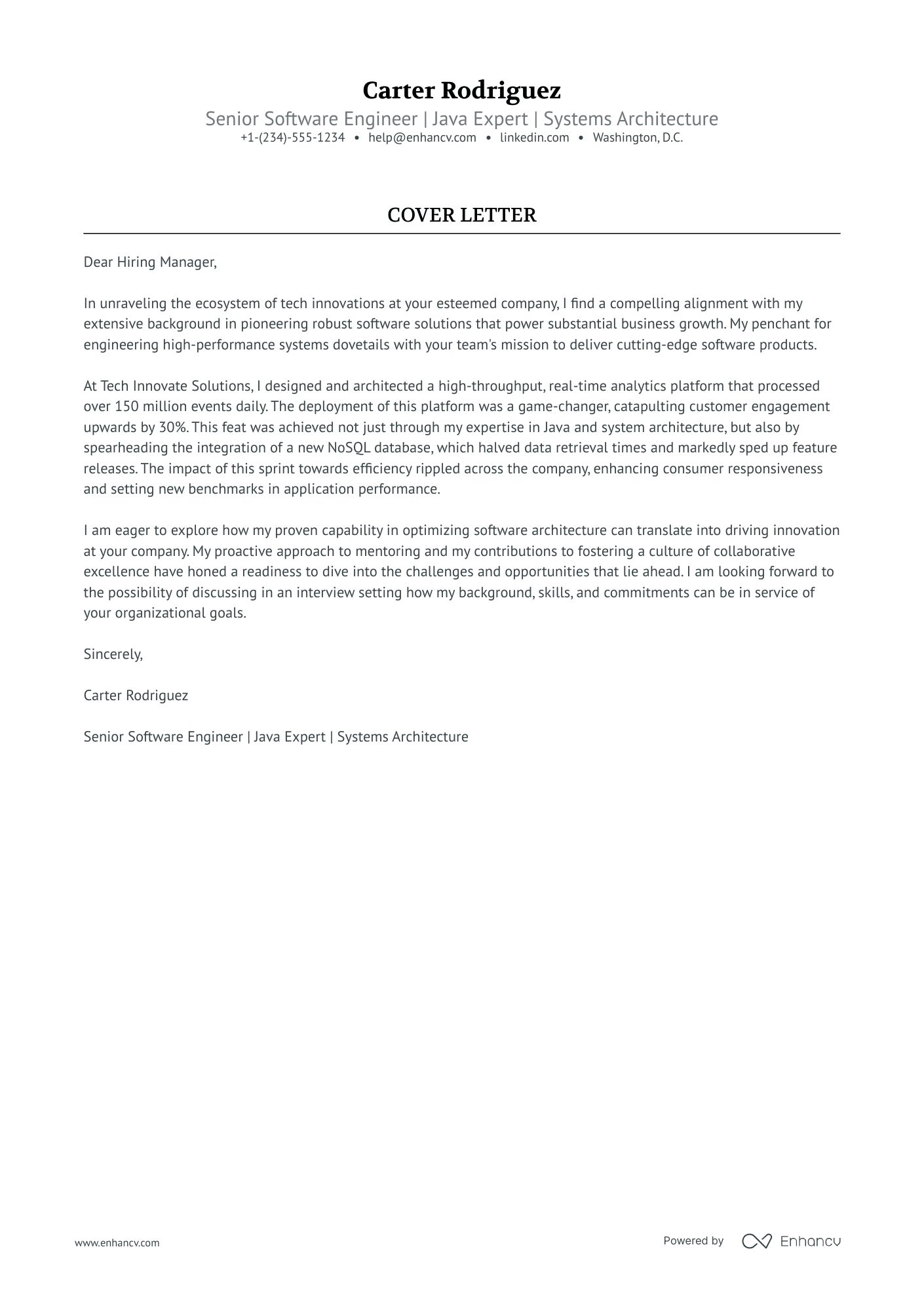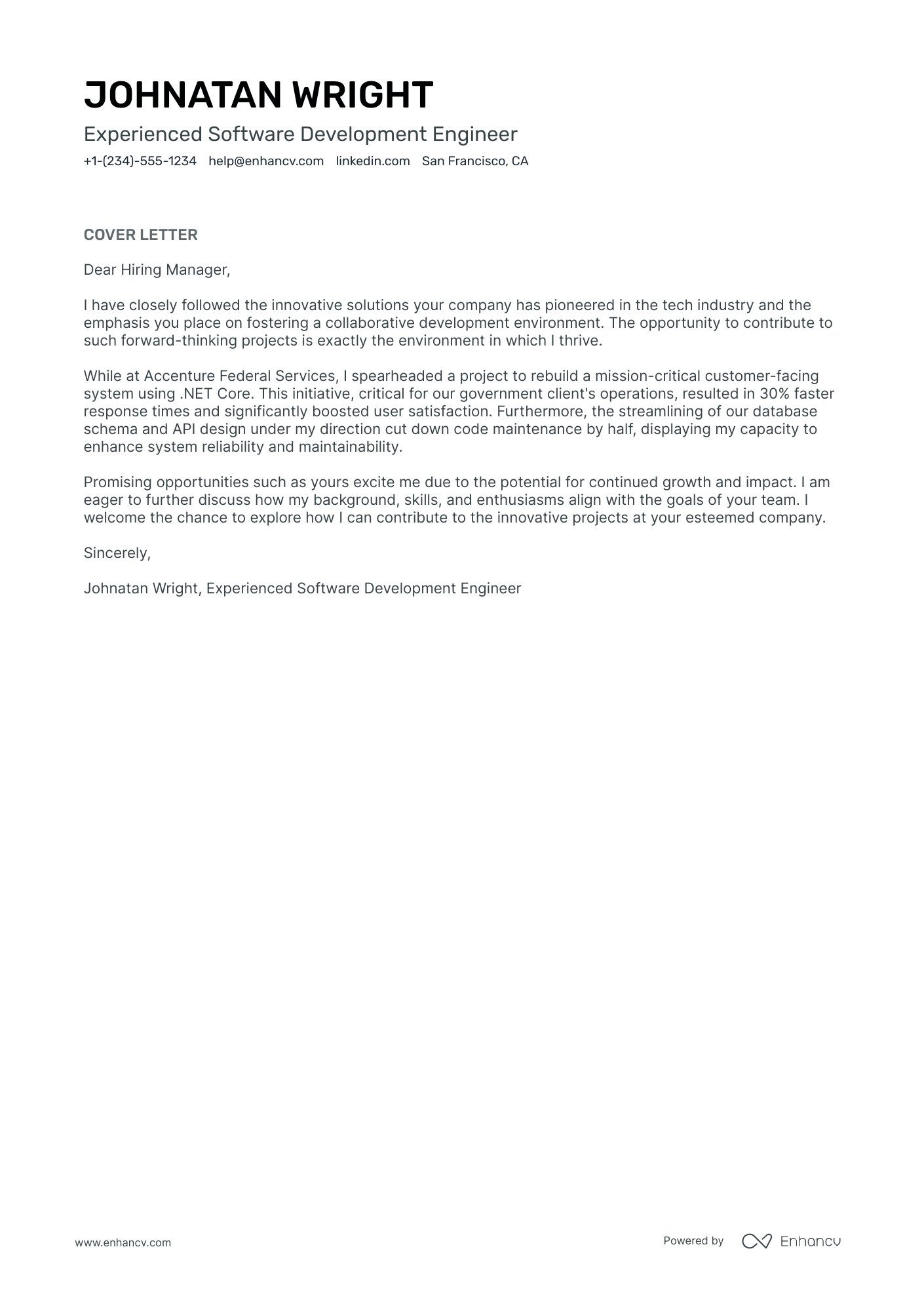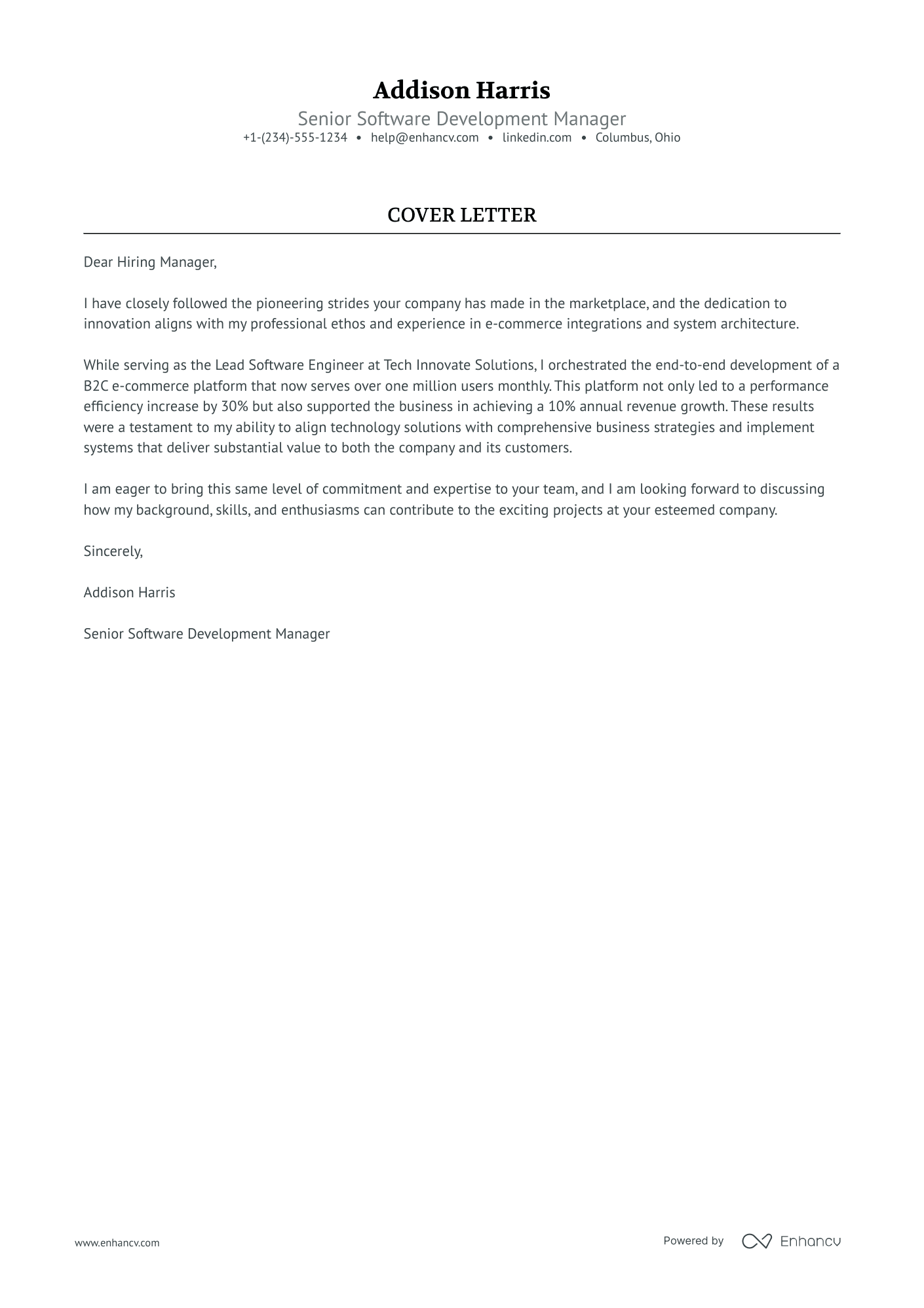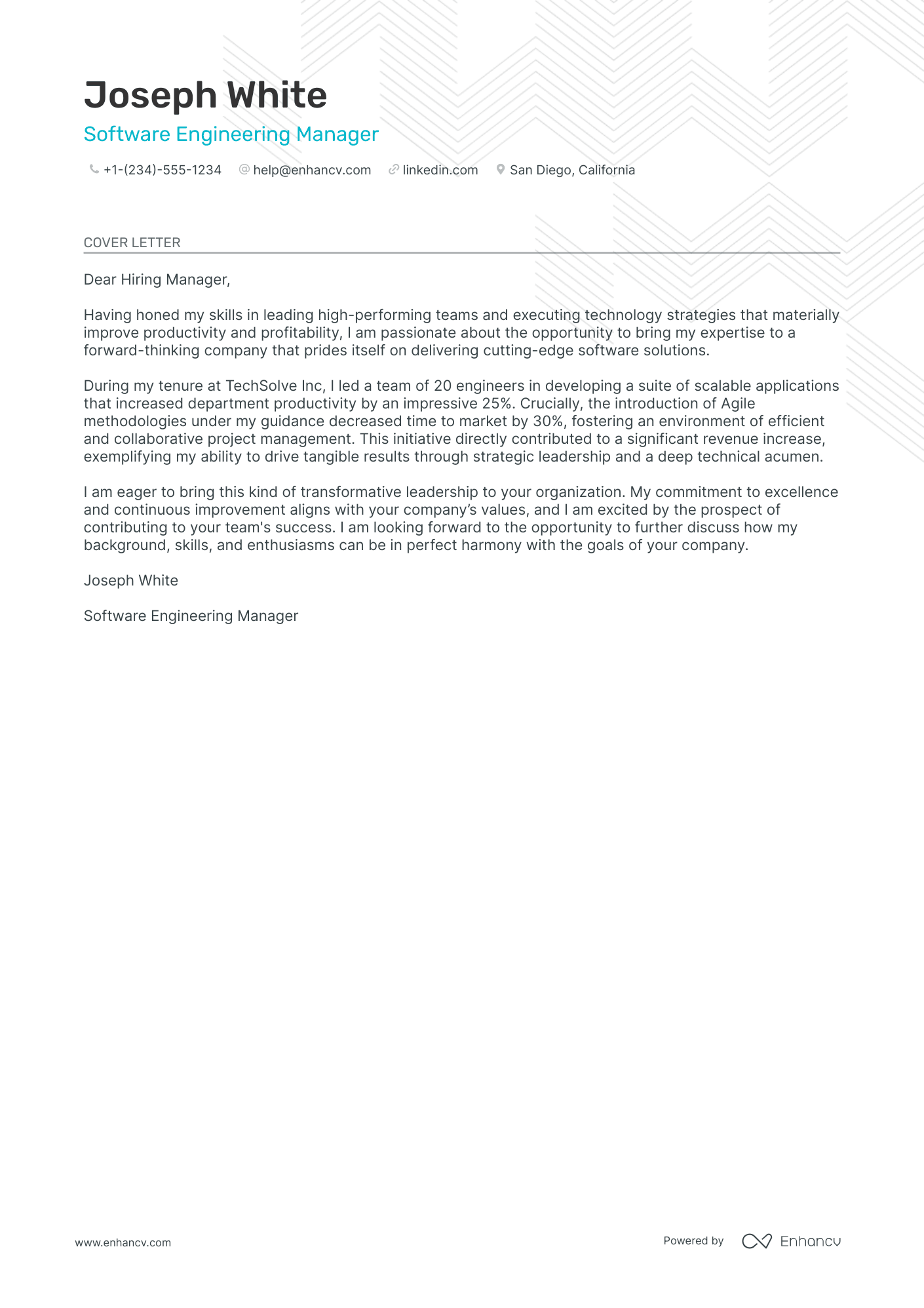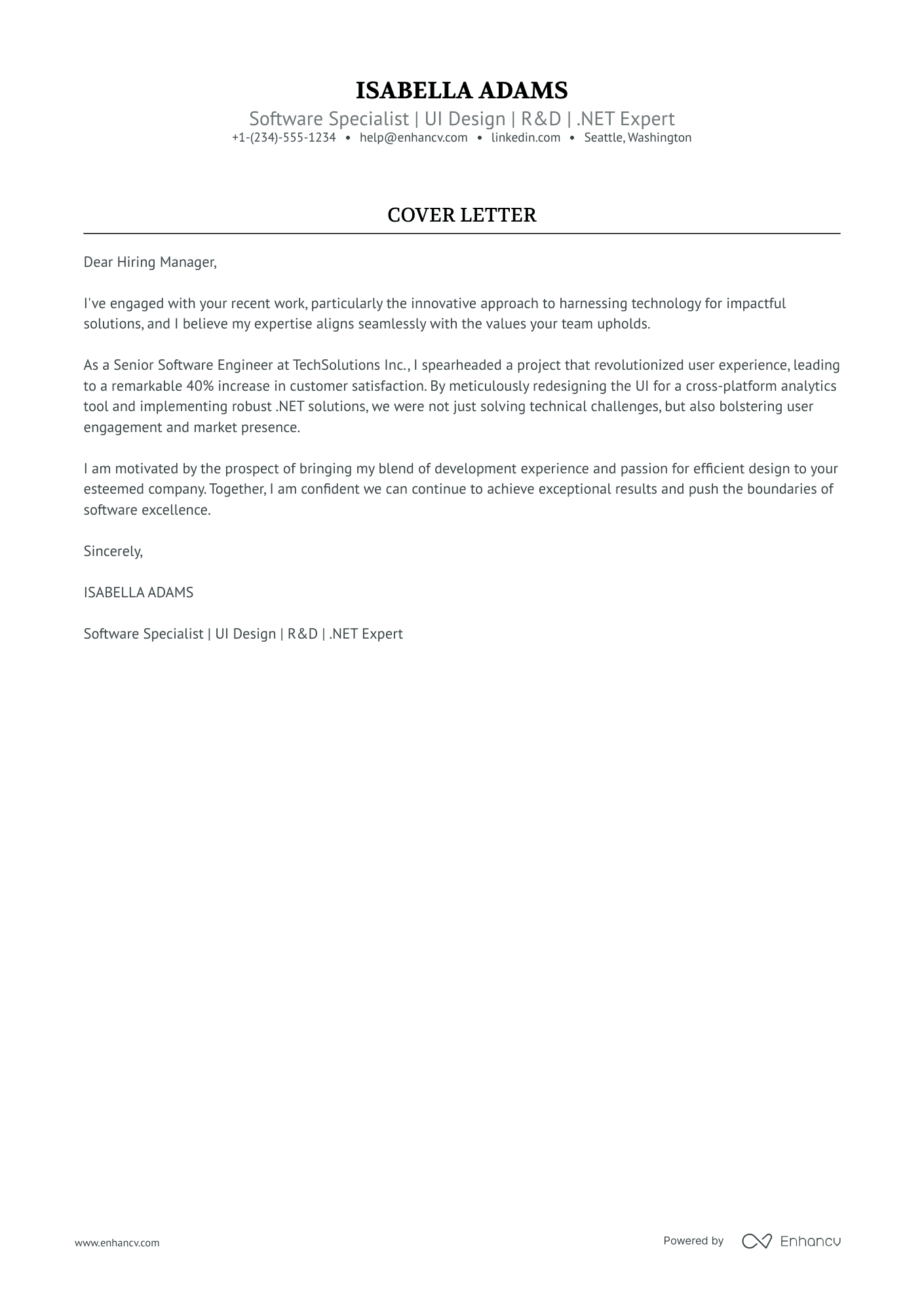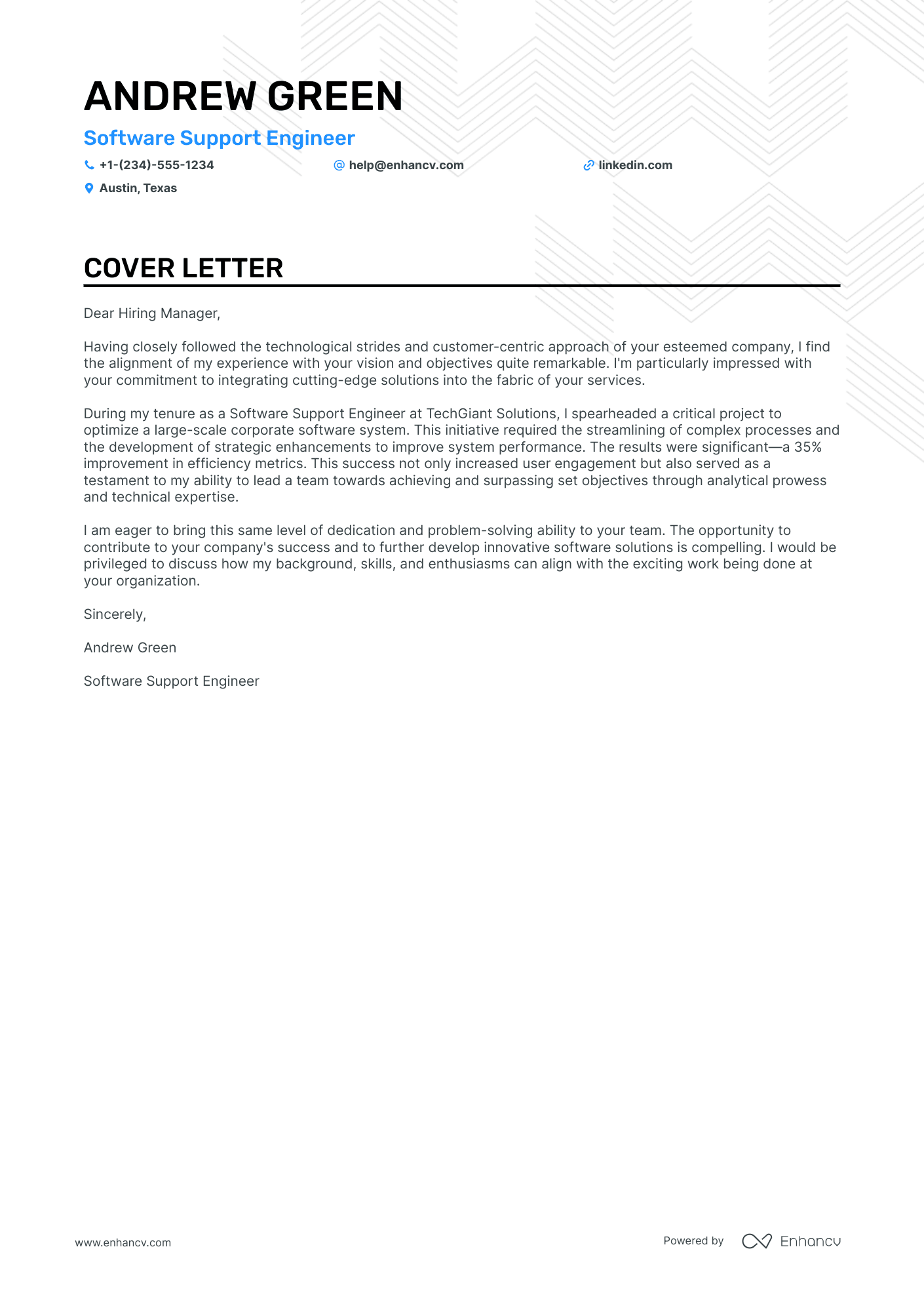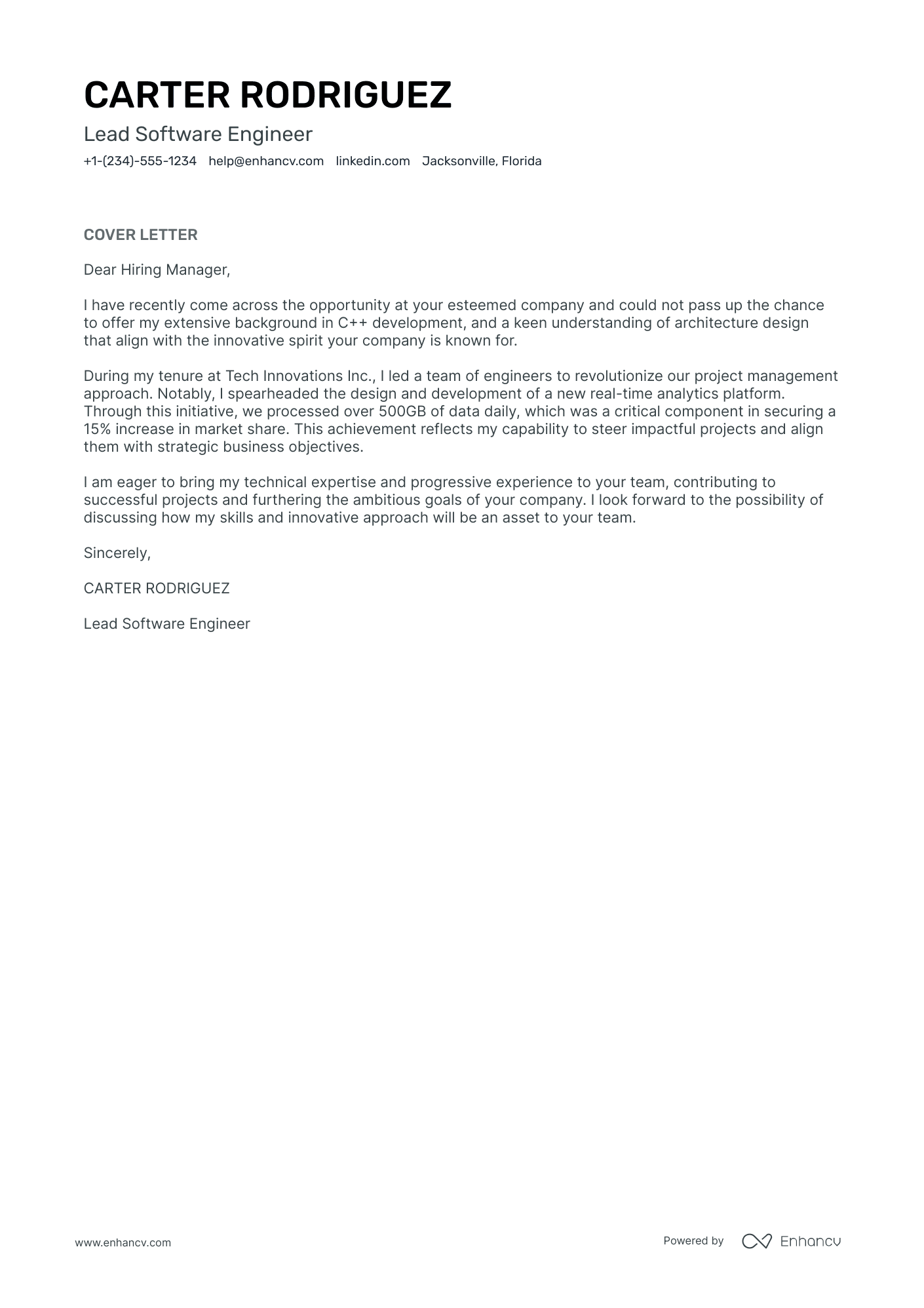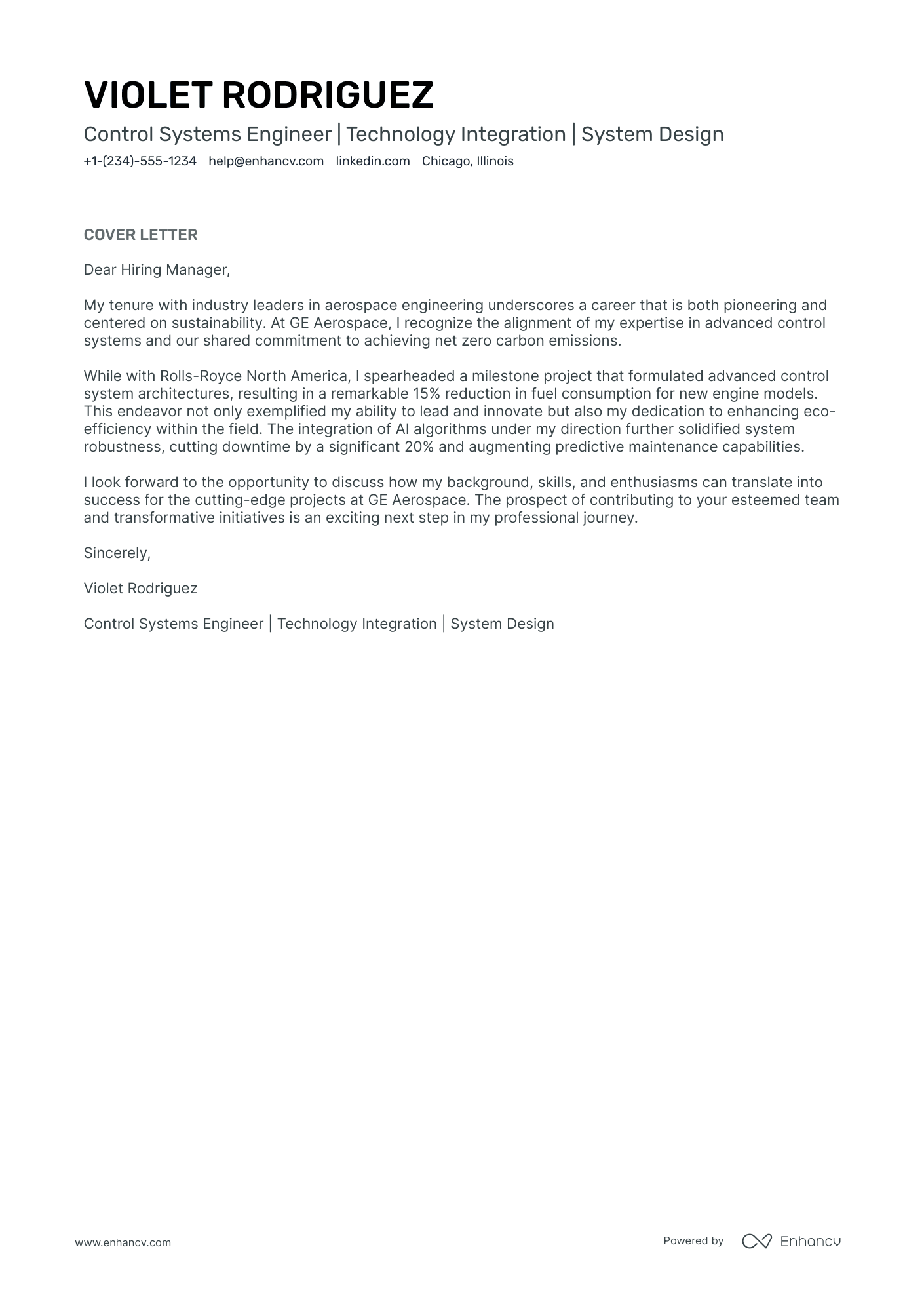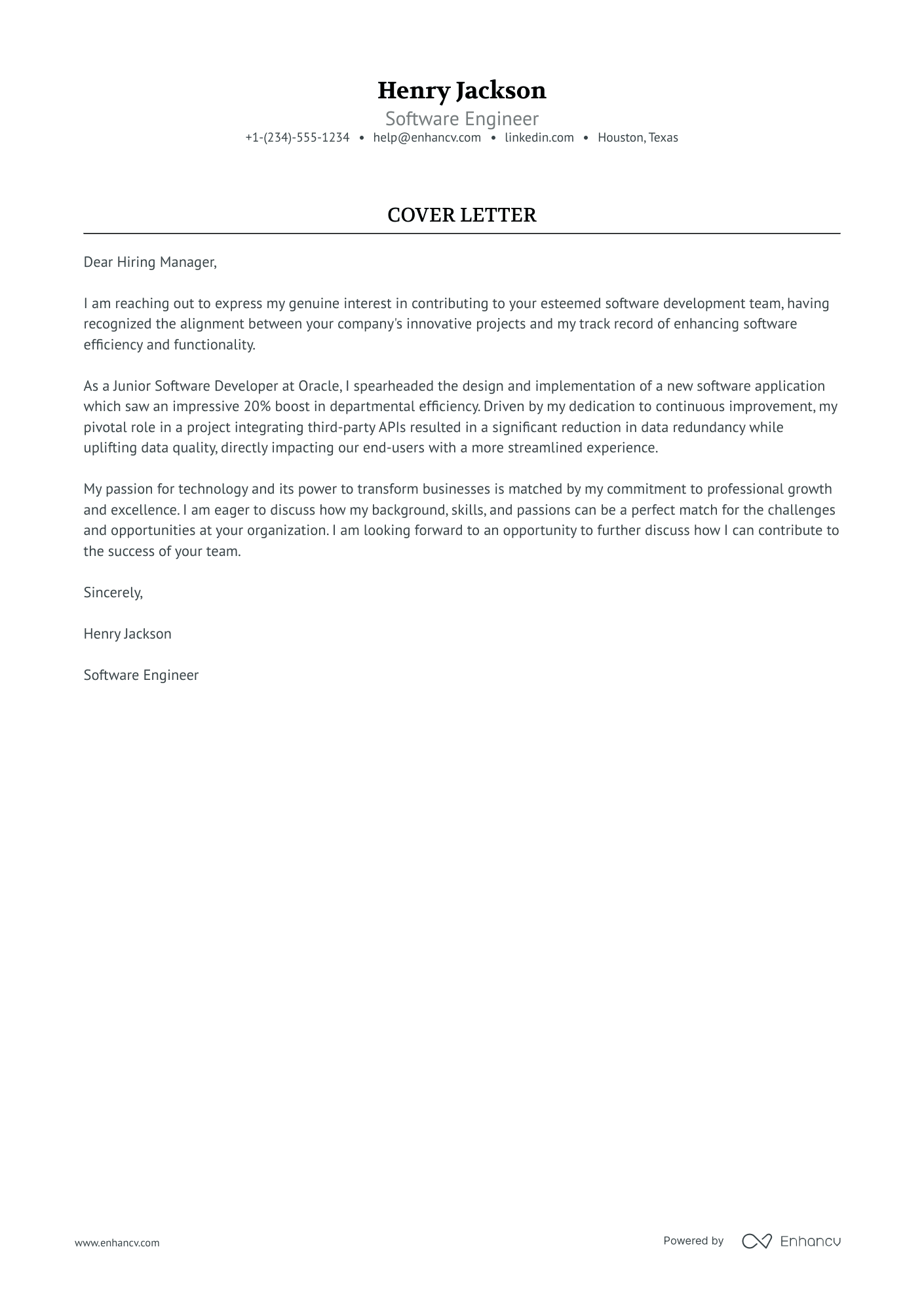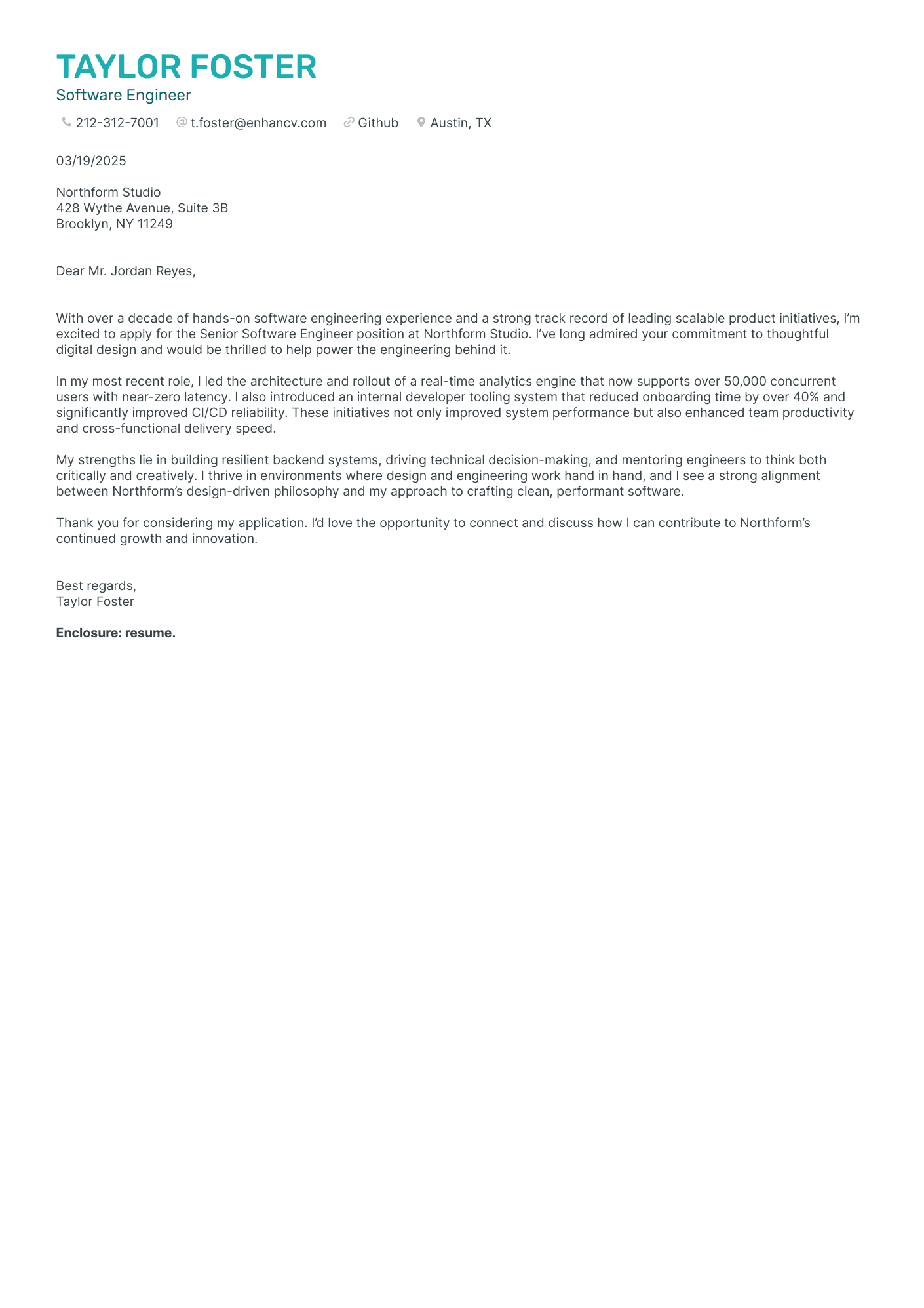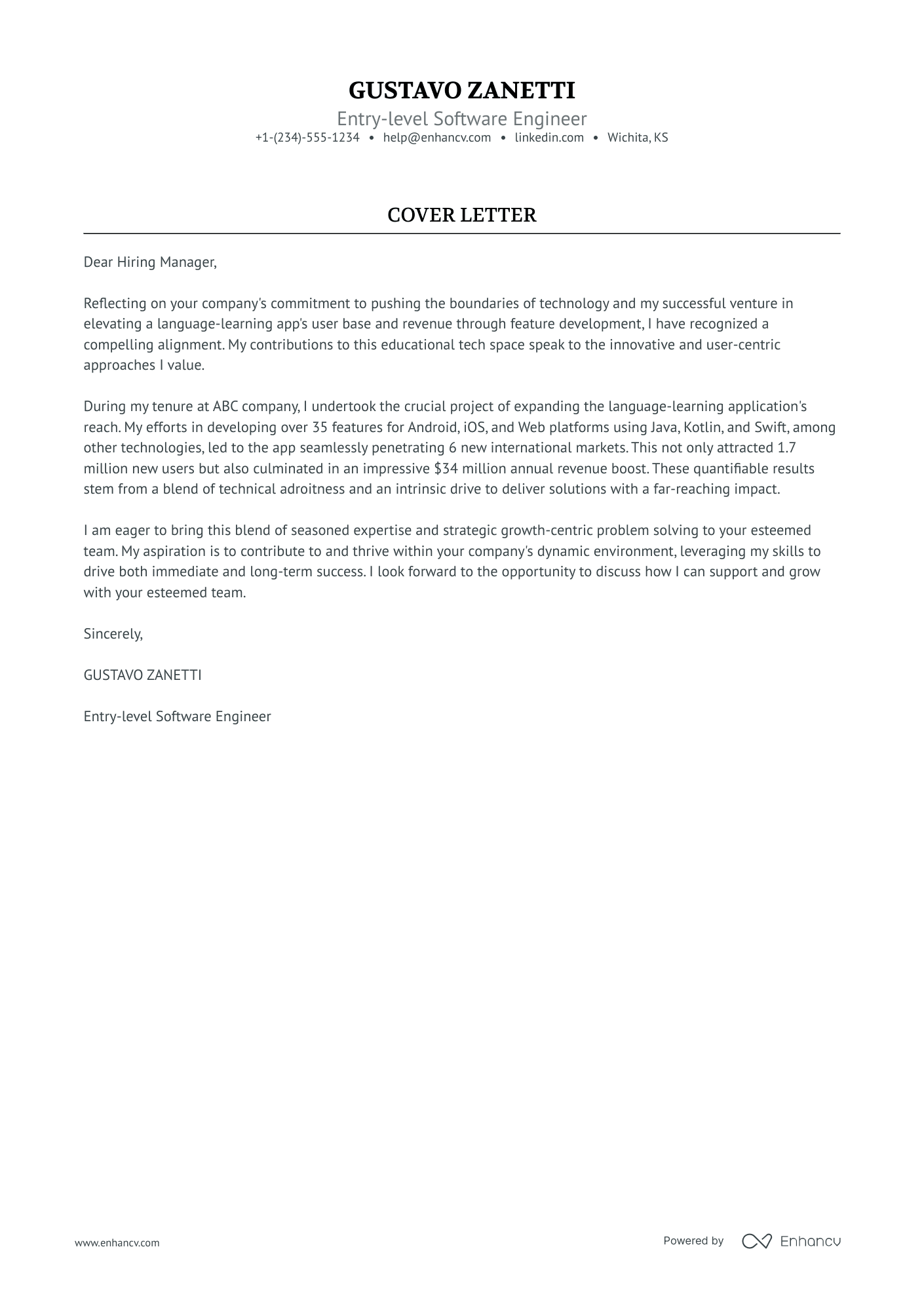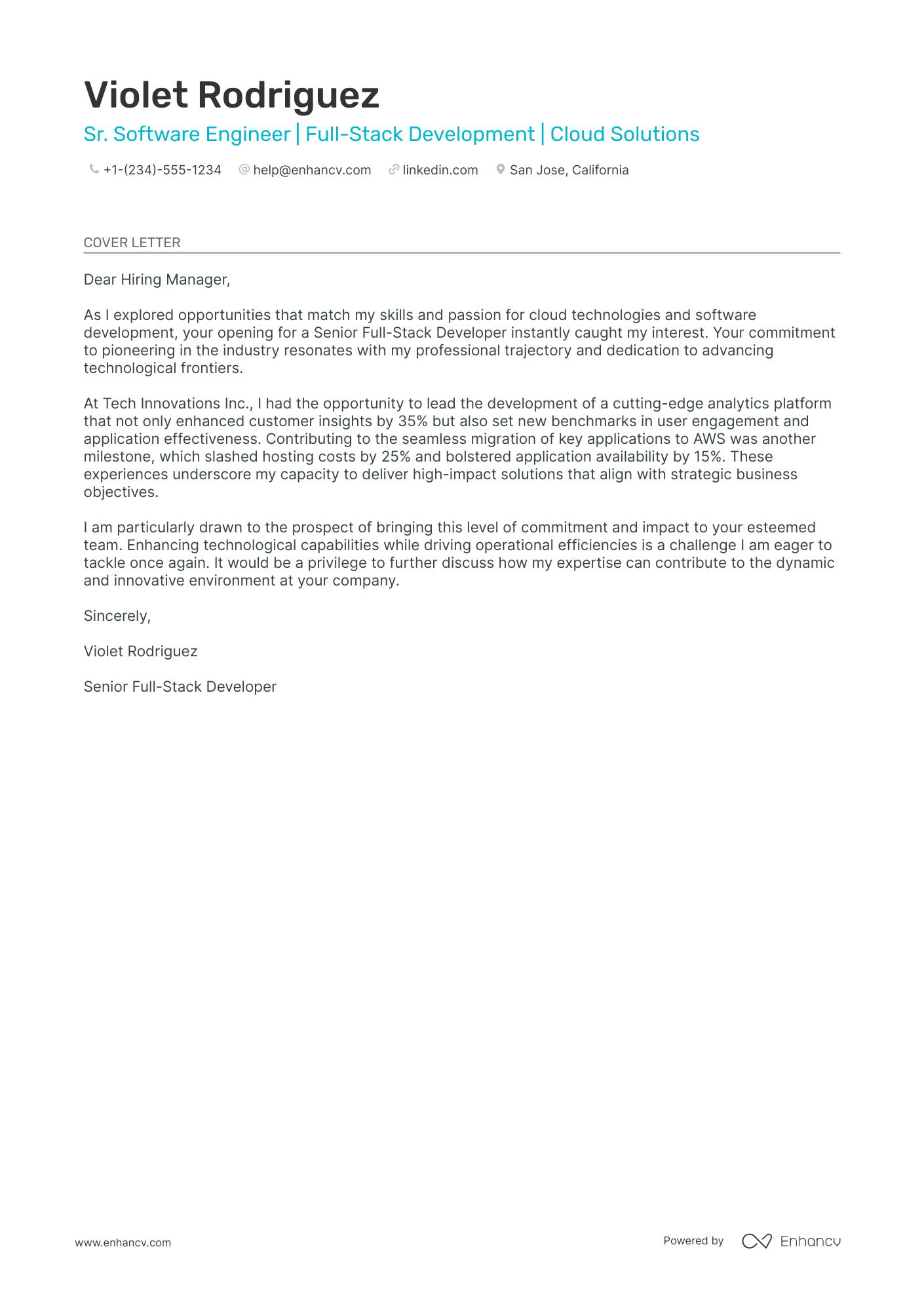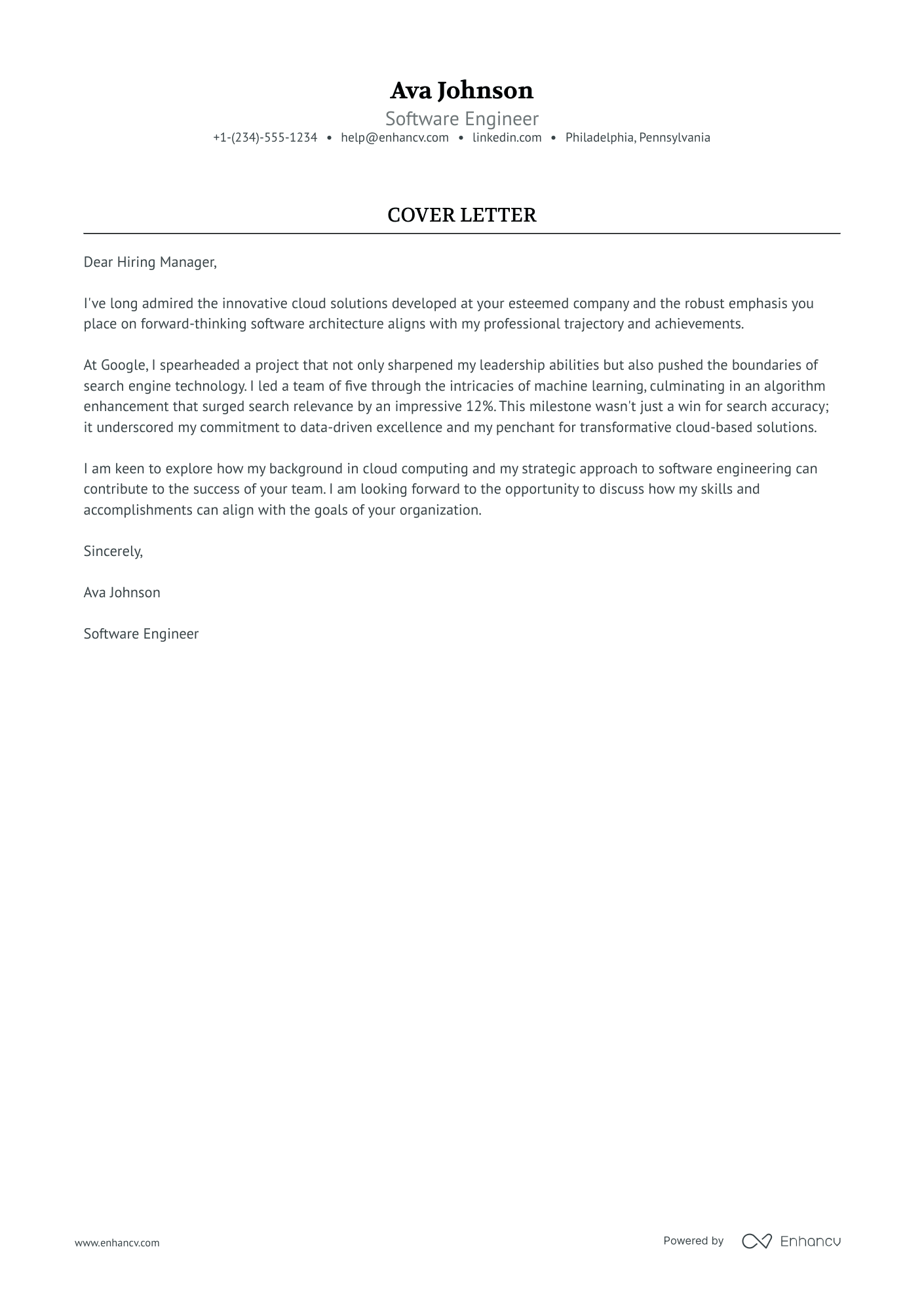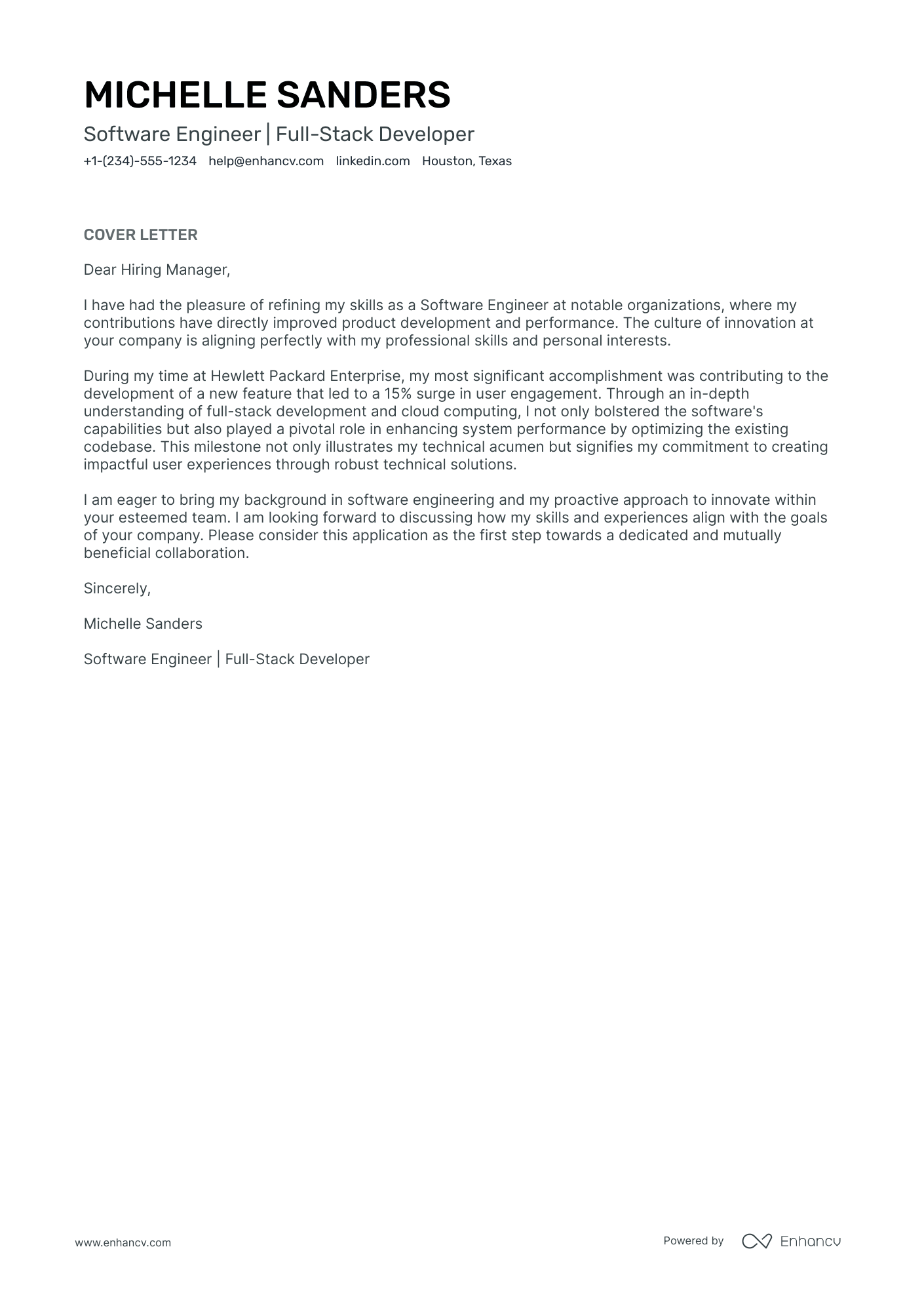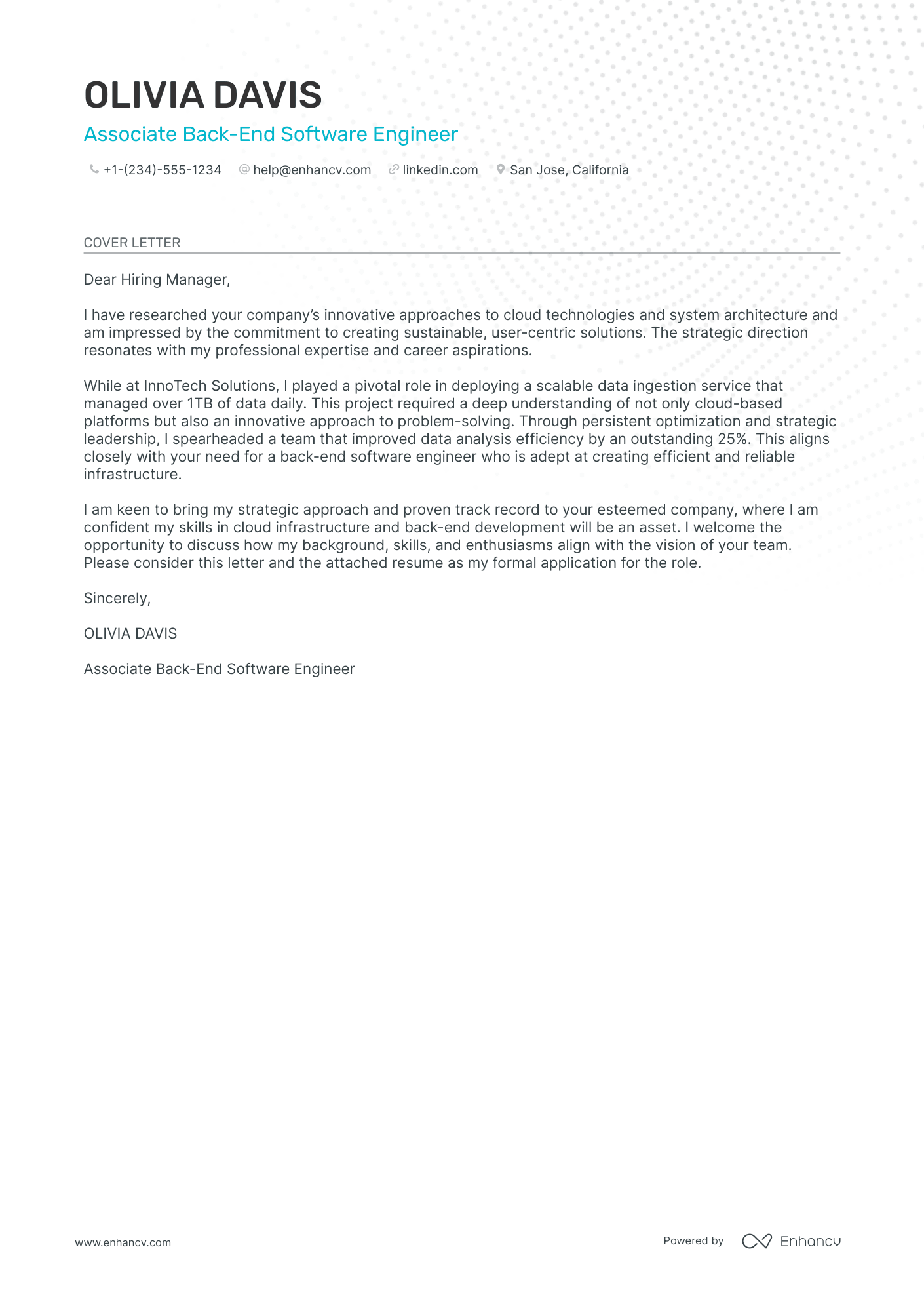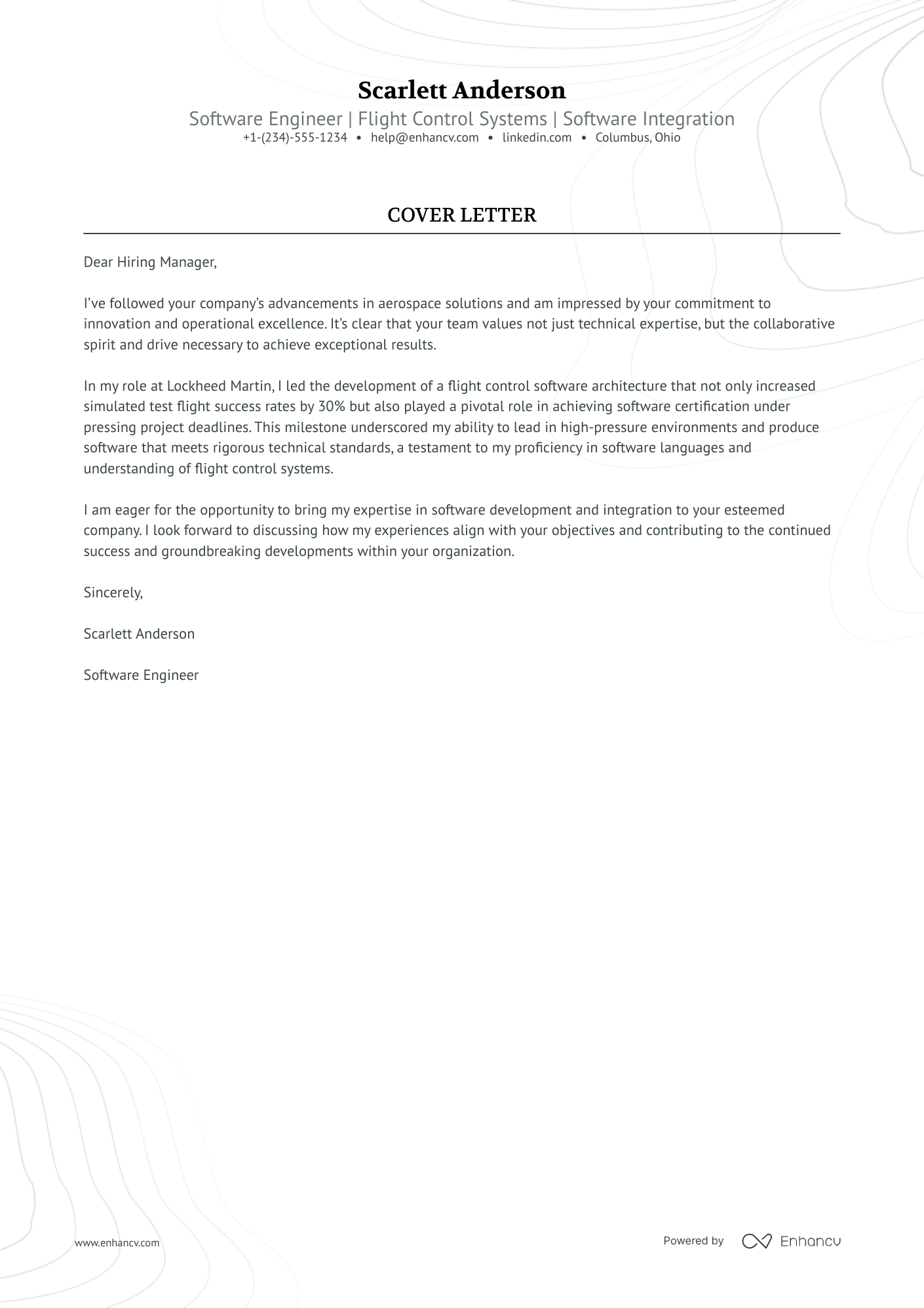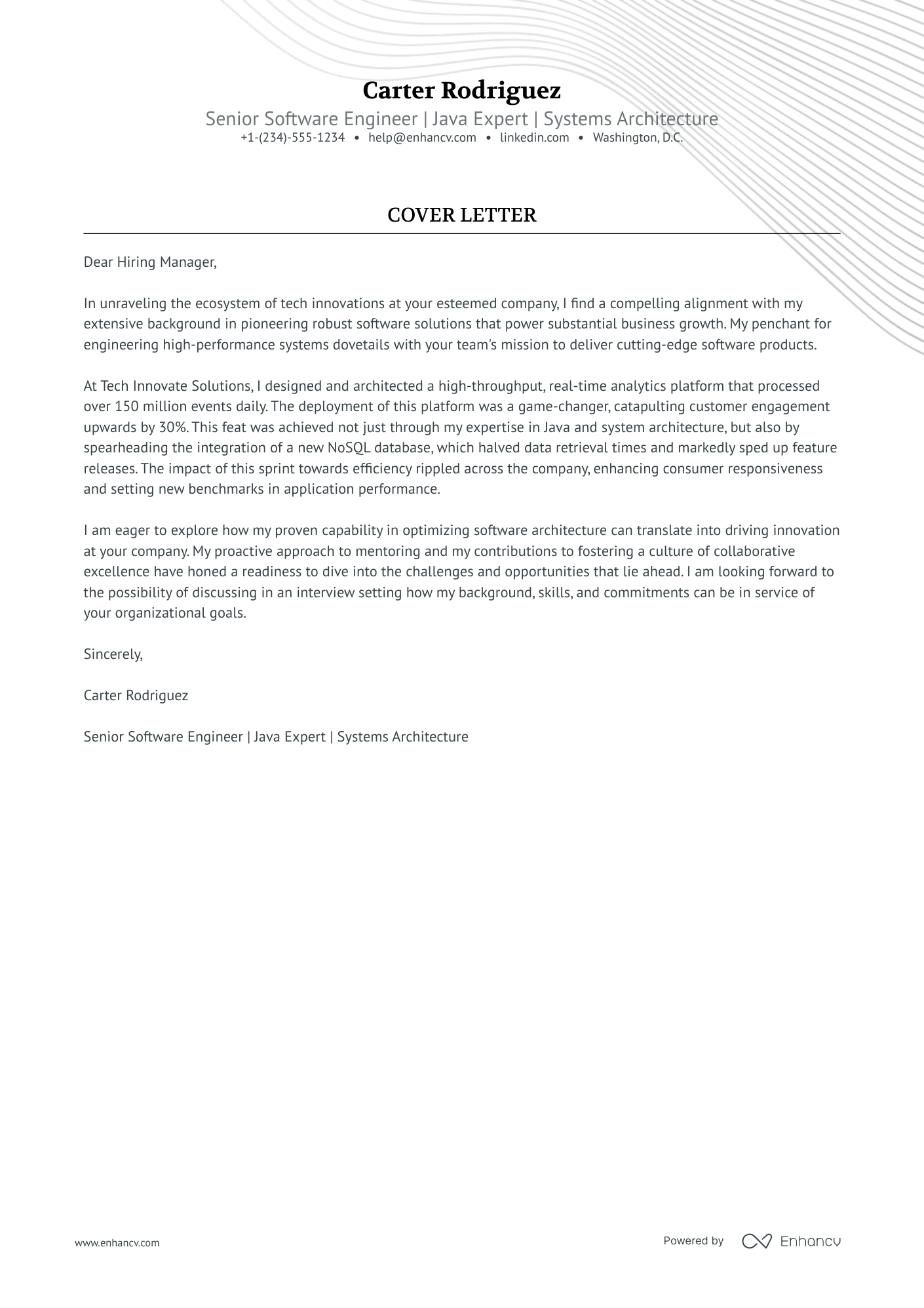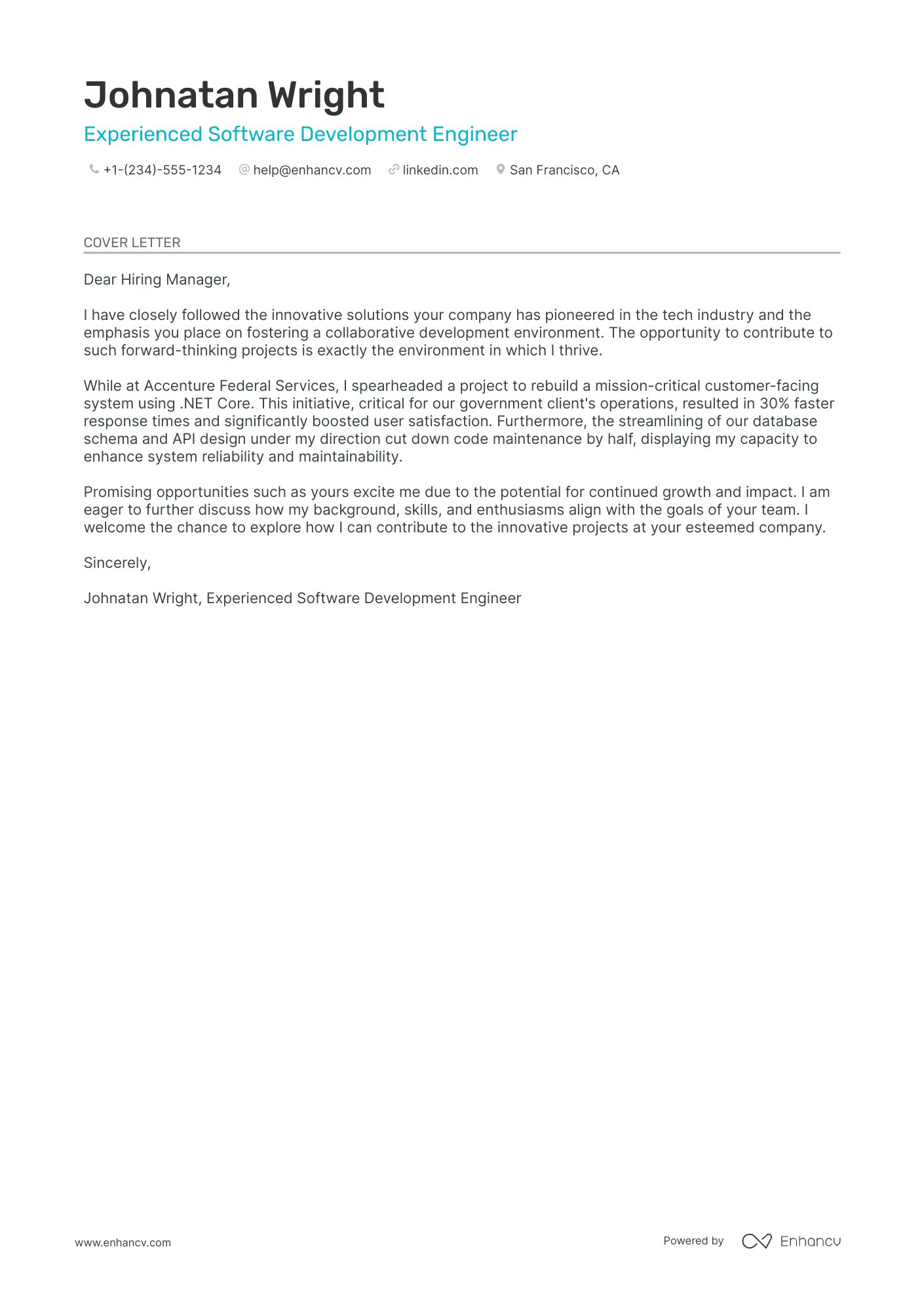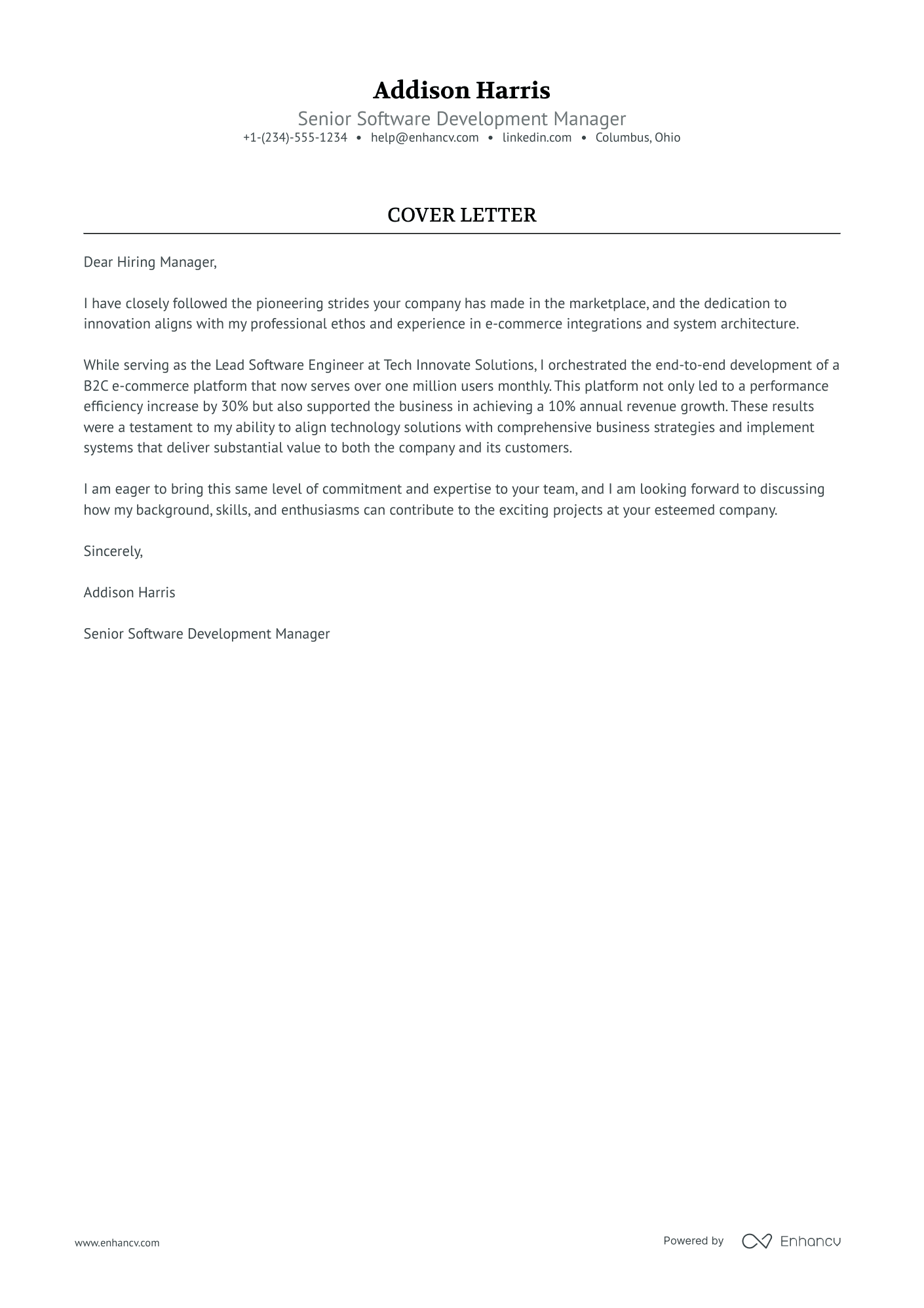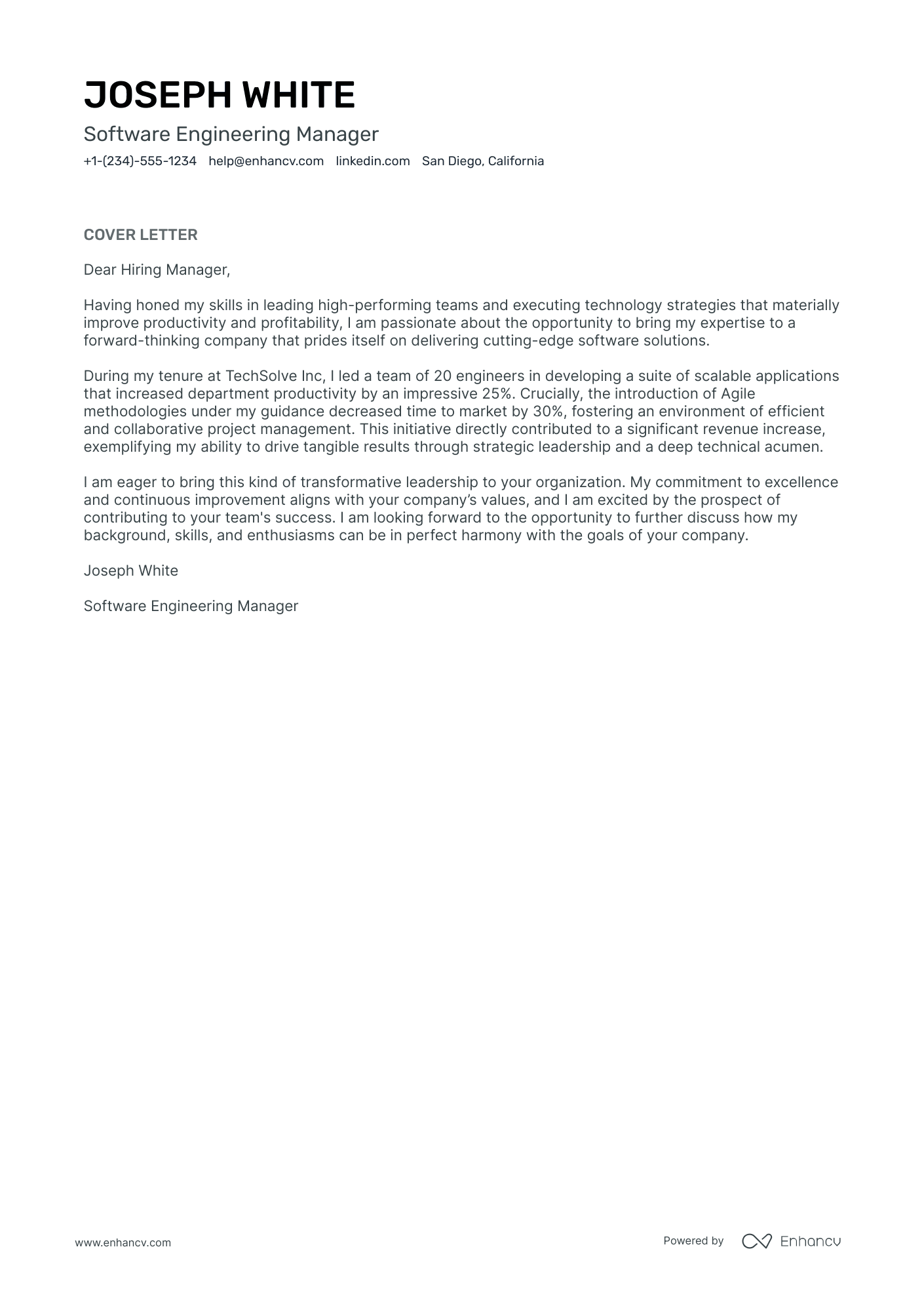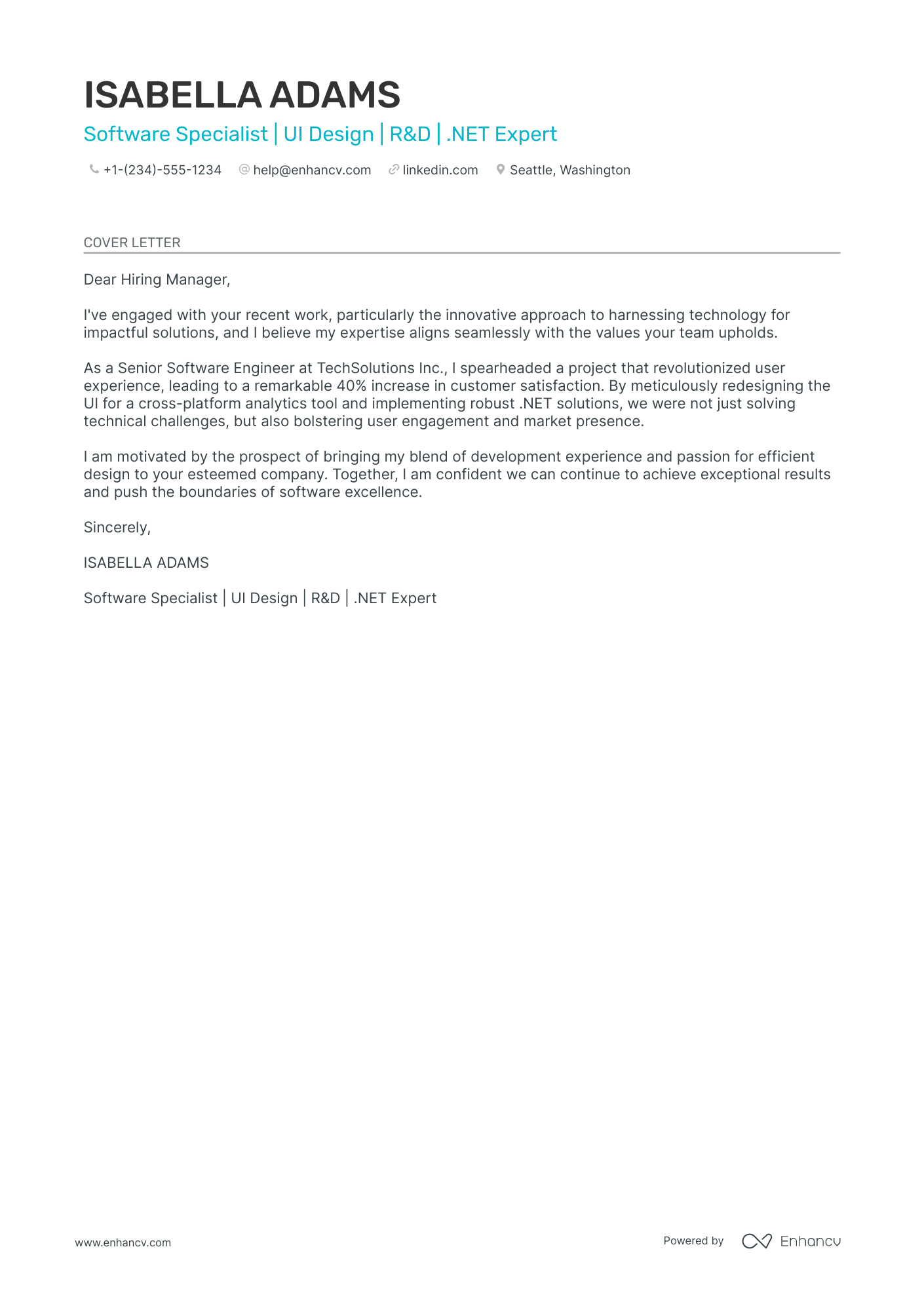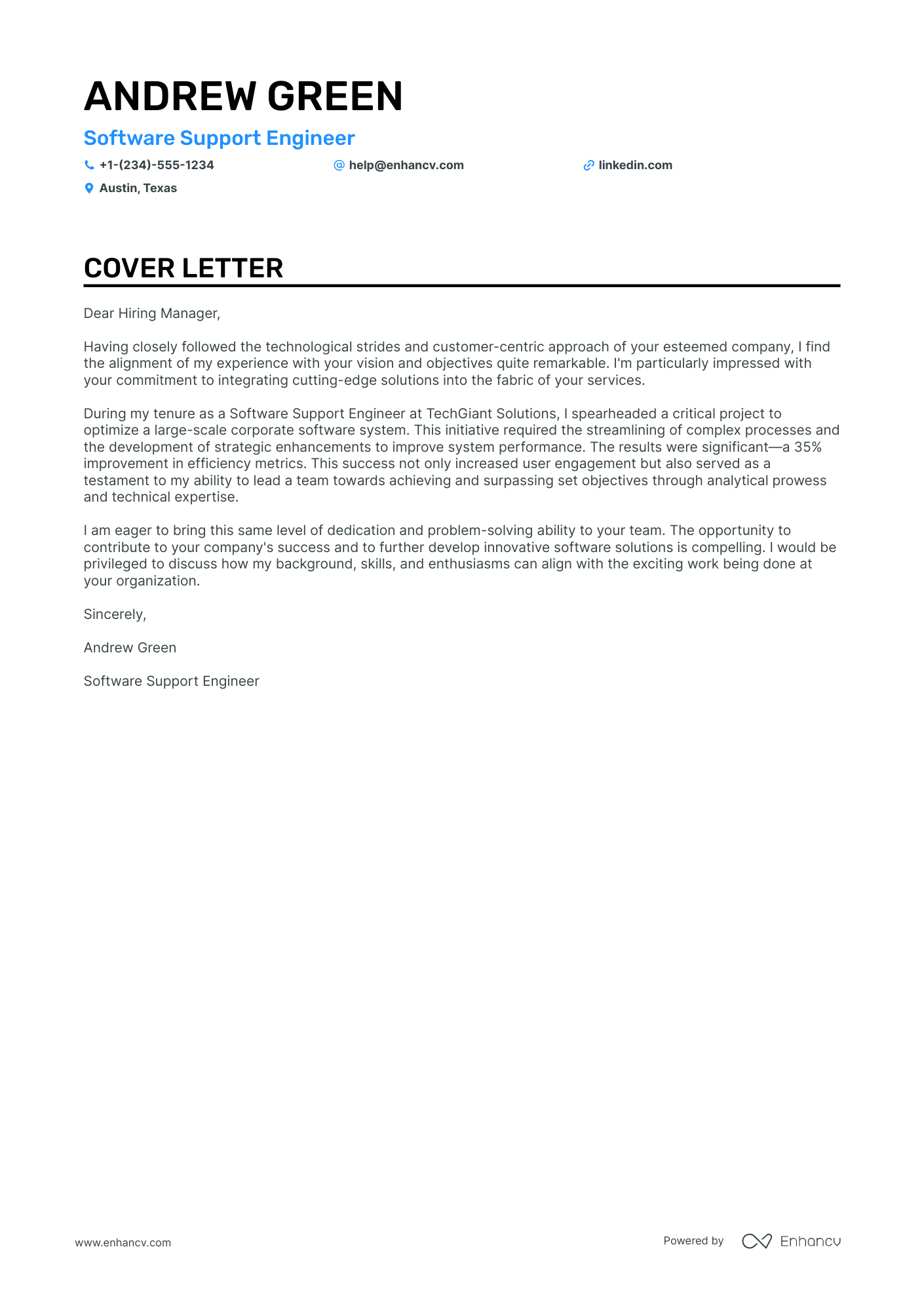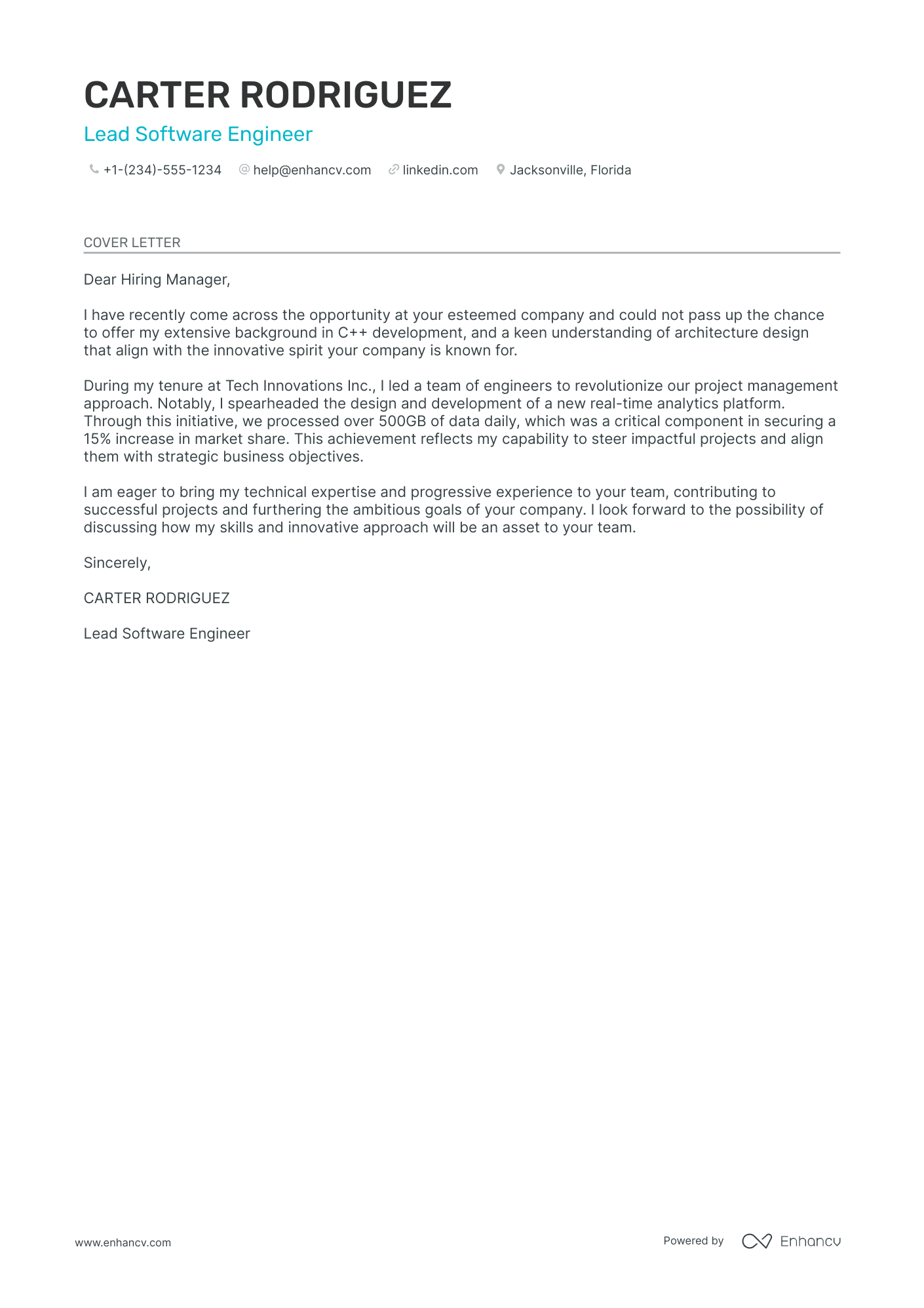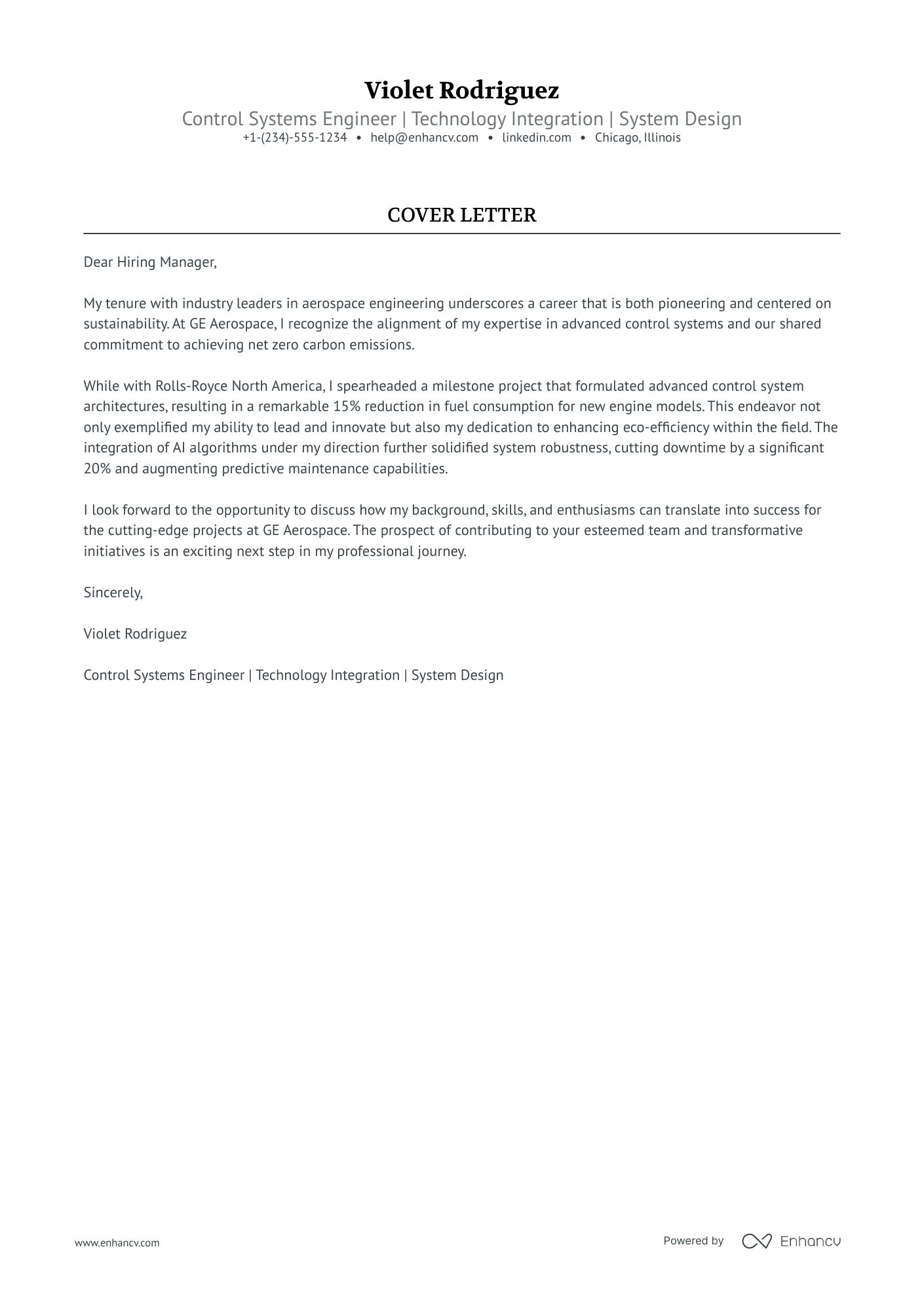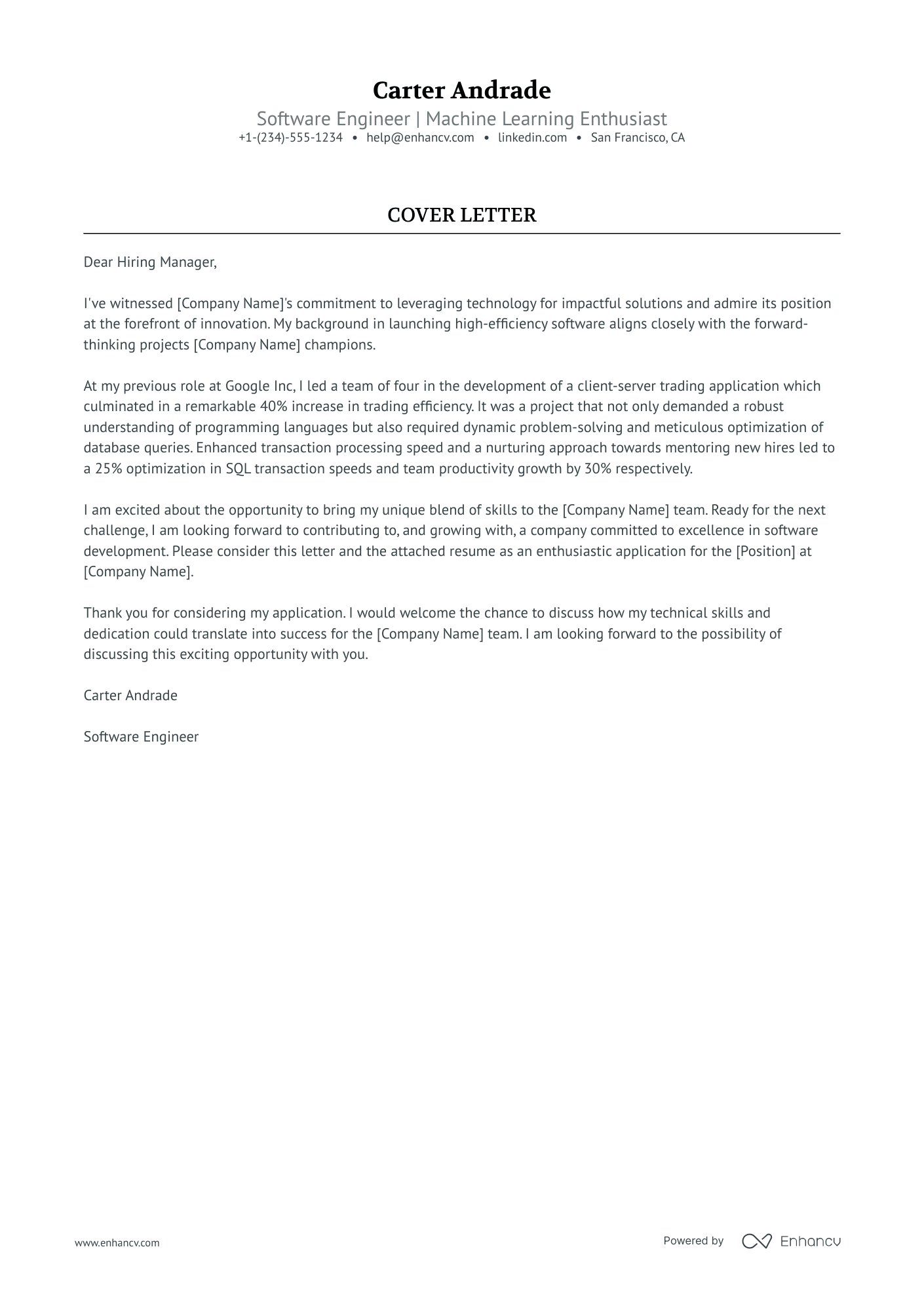Software engineers are no strangers to writing—but when it comes to cover letters, many would rather push code than prose. After all, a GitHub repository or technical portfolio often feels like a more direct expression of their skills.
Still, in a competitive industry—especially for early-career developers or those looking to level up—a strong cover letter can give candidates a critical edge. It gives hiring managers a fuller picture of your personality. Here’s how to write a compelling software engineer cover letter that speaks their language while standing out from the stack.
Key takeaways
- A well-formatted cover letter mirrors clean code—structured, readable, and purposeful.
- Always include essential contact info, plus links to GitHub, LinkedIn, or portfolio sites.
- Use the introduction to lead with a technical win and clearly tie your goals to the company’s mission.
- In the body, choose between a story-driven or bullet-point format to showcase your engineering impact.
- No experience? Focus on passion, personal projects, and transferable skills to show potential.
- Sign off professionally based on the company’s tone—and whether or not you know the hiring manager’s name.
PRO TIP
Your cover letter shouldn’t just repeat your resume line-by-line. Instead, use it to tell the story behind the work—the “why” and “how” behind your key contributions.
Software engineer cover letter example
If you’ve already got your software engineer resume, upload it to our cover letter generator to get a targeted letter in seconds.
Here’s a sample:
How to format a cover letter for a software engineer
Just like clean architecture and readable syntax make software easier to maintain, a well-structured cover letter makes it easier for hiring managers to assess your fit at a glance. That’s why you should consider the importance of your cover letter layout.
Tech recruiters often skim documents before committing to a full read, so clarity, structure, and polish can make your application stand out in a crowded inbox. Below, you’ll find a breakdown of how to format your software engineering cover letter for maximum impact.
Contact information
While your resume already includes your contact details, it’s essential to repeat them in your cover letter for consistency and quick access. A single typo in this section could mean a missed opportunity for a callback or interview.
Here’s how to format it:
- Place your full name at the top to ensure quick identification.
- Include your phone number, professional email address, and optionally, your current location (city, state).
- Add your GitHub, LinkedIn profile, or personal portfolio site—these are especially valuable in software roles. Below your contact info, include the current date.
- Add the hiring manager’s name (if available), their title, and the company’s name and address.
What if you work remotely?
Did you know 38% of programmers worked remotely in 2024? If you work at home or are available for an off-site position, instead of your location, you can simply state “Remote.”
Font, spacing, and margins
Engineers know that clarity matters—whether it’s in code or communication. Your cover letter design should reflect the same mindset: clean, functional, and professional.
Follow these tips for optimal formatting:
- Use a professional font (e.g., Rubik, Roboto, or Arial) at 10–12 pt size—ideally the same as your resume.
- Maintain single line spacing with one-inch margins, same as your resume, all around.
- Left-align your text for a clean, readable appearance.
- Keep your cover letter to one page, ideally between 250–350 words.
Sometimes, depending on the employer’s requirements, an e-note might be more appropriate than a cover letter. Check out the table below to learn the differences.
| COVER LETTERS | E-NOTES |
|---|---|
| The classic way to go | Easier to read on mobile devices |
| Follow standard business letter format | Follow a standard email format |
| More formal and longer | Less formal than a cover letter and shorter than one page |
| Enclosed as a separate printed document/attachment | Written directly in the email body |
The top sections on a software engineer cover letter:
- Header: This section includes your name, contact information, and links to your GitHub, LinkedIn, or portfolio, which are crucial for recruiters to easily access your technical work and reach out.
- Greeting: A personalized salutation shows attention to detail and professionalism—both key traits for a software engineer expected to write clean, user-focused code.
- Introduction: The intro should quickly highlight your engineering focus, years of experience, and a compelling reason you’re interested in the company or project.
- Body: This is where you demonstrate your technical impact by showcasing specific achievements, technologies used, and how you’ve contributed to team-based or independent projects.
Closing: A strong closing should reaffirm your enthusiasm, express alignment with the company’s tech goals, and include a clear call to action for next steps or an interview.
Key qualities recruiters search for in a software engineer cover letter:
- Proficiency in key languages and frameworks: Skills in tools like JavaScript, Python, React, or Node.js let you hit the ground running.
- Experience with Git and team workflows: Familiarity with version control and CI/CD shows you’re ready to work in agile, collaborative teams.
Strong problem-solving skills: The ability to debug and solve complex issues quickly is essential for building solid software. - Knowledge of system design: Understanding how to build scalable, efficient systems is a big plus for long-term success.
- Commitment to learning: Staying updated with new tech, tools, or open-source projects shows you’re growing with the field.
- Good communication and teamwork: Working well with designers, PMs, and other devs is key to building great products.
We’ve got the formatting basics down. Let’s move on to the content.
How to write your software engineer cover letter salutation
Starting a conversation isn’t always a software engineer’s strong suit—many of us are more comfortable solving complex problems in code than crafting the perfect email. But in a competitive industry such as IT, addressing your letter to the right person shows you’ve done more than just forked a template—it proves you’re intentional and serious about the role.
If the hiring manager’s name isn’t listed in the job description, try checking the company’s LinkedIn, browsing their engineering blog, or scanning team pages. Even if you don’t find a name, you can still strike the right tone with a greeting that’s tailored to the team or department.
Skip the “Dear Sir or Madam” default, and go with something that feels relevant, modern, and appropriate to a collaborative engineering environment.
What to use when you don’t know the hiring manager’s name
- Dear [Hiring Manager’s Name],
- Dear [Company Name] Engineering Team,
- Dear [Specific Team] Hiring Manager (e.g., Dear Infrastructure Engineering Hiring Manager),
- Hello [Company Name] Dev Team,
- Dear Engineering Leadership at [Company Name],
- Dear [Company Name] Developer Hiring Panel,
See? Even if you’re not the greatest communicator, you can still start off strong. Let’s catch this momentum and build up with the introduction.
How to write your software engineer cover letter intro
Your cover letter introduction should work like a clean, well-written function: it can’t do everything, but it sets up the rest of the system to succeed. For software engineers—especially those newer to the field or looking to grow—a strong intro is your chance to establish context, communicate enthusiasm, and give hiring managers a reason to keep reading past the first few lines.
This opening should answer three key questions:
- Why this role, at this company? Show genuine interest in their product, mission, or engineering culture—something that goes beyond “I need a job.”
- What makes you a strong fit? Mention your experience level and technical focus (e.g., full-stack development, machine learning, DevOps), and lead with a standout skill or project.
- How can you add value? Make it clear you understand what the company is building and hint at how your contributions could support that vision.
Forget about starting your cover letter with the tedious “I’m excited about the role…”. It’s an overly used phrase that doesn’t impress recruiters.
Try something like this instead:
Google software engineer cover letter intro
Last year, I led the redesign of a cloud-based API that reduced latency by 40% and now supports over 1M daily requests. I’m excited to bring this same focus on performance and scale to Google’s engineering team. With experience in Python, distributed systems, and cloud infrastructure, I’m driven by building products that make a global impact—and Google’s engineering culture and reach are exactly where I hope to grow next.
This intro is strong because it opens with a concrete, quantifiable achievement, immediately demonstrates technical relevance, and clearly connects the candidate’s goals with Google’s mission—all in a concise, compelling way.
Now, let’s move on to the most integral part of your cover letter—the body.
How to write your software engineer cover letter body
The body of your cover letter is where you shift from interest to impact—where you show the real value you bring as an engineer. Instead of rehashing your resume or listing job duties, focus on examples that demonstrate your technical strengths, problem-solving mindset, and collaboration skills.
Whether you’re an experienced developer, a career switcher, or just starting out, this section is your chance to highlight how you’ve solved tough bugs or improved systems through thoughtful, well-written code. Use specifics. Quantify where possible. And above all, connect your experience to the kind of challenges this company is solving.
Here are key areas to highlight:
- Technical accomplishments: Describe systems you’ve built, bugs you’ve crushed, or features you’ve led. Use metrics: load times improved, users impacted, performance gains, etc.
- Problem-solving and innovation: Show how you approached a tough technical challenge or introduced a new tool, pattern, or process that made a difference.
- Cross-functional teamwork: Highlight your collaboration with designers, PMs, QA, or other engineers. Great software rarely happens in isolation.
- Code quality and scalability: Demonstrate that you care about clean architecture, testing, and long-term maintainability.
- Ownership and initiative: Whether it’s mentoring a new hire or rebuilding a legacy system, showcase moments where you took the lead.
The two most common approaches to structuring your body are the narrative and the bulleted approach.
Let’s break them down.
Narrative approach
This is a storytelling style that works well if you want to focus on one standout experience, especially one that involved creative thinking, teamwork, or big impact. Such a story usually doesn’t fit on a resume where limited space is reserved for strong and concise achievements.
Here’s an example:
Principal software engineer cover letter body
When our monolithic system started slowing down development and deployments, I led a company-wide migration to microservices. I designed the new architecture in Go with gRPC, aligned four engineering teams around the plan, and guided the rollout through production with zero downtime. The result: deployments dropped from 45 minutes to 8, and cross-team velocity jumped significantly. Beyond the technical win, it was a turning point in how our org approached scalability, collaboration, and long-term engineering investment.
Bulleted approach
For many software engineers, a bulleted format is the most natural and effective way to communicate impact. It mirrors the clarity of good documentation—easy to scan, structured, and results-focused. This style works best when you have several strong accomplishments and want to quickly show your value.
Each bullet should highlight a specific achievement, ideally with metrics, and reflect your technical skills, leadership, or problem-solving ability. Keep it concise, action-driven, and tailored to the role.
Use this format if:
- You have three to five key wins to showcase.
- You want to emphasize range over depth.
- You’re applying in a fast-paced or high-volume hiring environment.
Let’s check out a sample of a software engineer cover letter using the bulleted approach.
Software test engineer cover letter body
In my role as a Software Test Engineer, I’ve focused on building scalable, reliable testing frameworks and collaborating closely with dev teams to ensure product quality from day one. Below are a few highlights that reflect my impact:
- Developed and maintained a Selenium-based automation suite, reducing manual regression testing time by 70%.
- Designed test plans and executed over 1,000 test cases for a high-traffic e-commerce platform, helping catch critical issues before production.
- Integrated automated testing into the CI/CD pipeline using Jenkins and GitHub Actions, speeding up release cycles by 30%.
- Led bug triage meetings across QA and engineering teams, improving issue turnaround time and cross-team visibility.
- Built a performance testing framework with JMeter to simulate high user loads, uncovering bottlenecks prior to a major product launch.
These achievements reflect a strong focus on quality, automation, and cross-functional collaboration—key strengths I’d bring to your engineering team.
This example is easy to scan and highlights real, measurable results. It shows both technical skills and teamwork, which are essential for a software test engineer.
Okay, then. We’ve discussed how to approach the body of your cover letter when you have solid industry experience. But what if you don’t? That’s exactly when a cover letter becomes even more valuable.
How do I write a software engineer cover letter with no experience
Without a long resume to lean on, your cover letter is the place to show your passion for software engineering, highlight transferable skills, and tell the story behind your learning journey—whether that’s through a bootcamp, personal projects, open-source contributions, or a CS degree.
Here’s how to make it count:
- Lead with motivation: Why software engineering? What drew you in? Show that your interest runs deeper than just wanting a job.
- Show your work: If you’ve built side projects, contributed to GitHub, or solved real problems in a class or bootcamp, talk about them.
- Highlight relevant skills: Even without formal experience, you may have practiced working in teams, debugging, or using tools like Git, APIs, or React.
- Connect to the company: Show that you understand what they do and explain why you want to grow there.
Let’s look at a template cover letter for a software engineer intern. You can use it as a base or browse through our cover letter examples to find one you like and use it as an outline for your own.
Software engineer intern cover letter
MM/DD/YYYY
Company Address
Dear [Hiring Manager’s Name],
I’m a computer science student at [University Name] with a strong interest in backend development and building reliable, scalable systems. I’m excited to apply for the Software Engineering Internship at [Company Name] because of your focus on innovation and mentorship—two things I value deeply as I grow in this field.
Recently, I built a full-stack task management app using React, Node.js, and MongoDB, which helped me strengthen my understanding of APIs, state management, and deployment workflows. I also contributed to an open-source project on GitHub, where I fixed bugs, wrote unit tests, and participated in peer code reviews. These experiences helped me develop real-world coding habits and learn how to collaborate effectively in remote, async environments.
I’d be thrilled to bring my curiosity, dedication, and willingness to learn to [Company Name]’s engineering team. Thank you for considering my application—I look forward to the opportunity to contribute and grow.
Sincerely,
[Your Full Name]
We’re almost done! Let’s see how to finish your cover letter effectively.
How to write the closing paragraph
You don’t need to overengineer your closing—by now, your core message has been delivered. The final paragraph is your chance to end with confidence, show continued enthusiasm for the team or product, and leave the door open for further conversation.
In your cover letter ending, reaffirm your interest, highlight your fit, and invite the hiring manager to connect.
Senior software engineer cover letter closing
I’m excited about the opportunity to contribute to Spotify’s mission of connecting people through the power of audio. With over seven years of experience building scalable backend systems and mentoring engineers, I’m confident I can support the platform’s continued growth and innovation.
Thank you for considering my application—I’d welcome the chance to connect and discuss how I can contribute to your engineering team.
Sign-off options for software engineer cover letters
For software engineers, choosing the right sign-off depends on two key things: the tone of your letter and whether or not you know who you’re addressing. Just like naming a function or writing a commit message, clarity and context matter. Below are common sign-offs and when to use each, depending on the role, company culture, and level of familiarity.
| Sign-off | What’s the tone and when to use |
|---|---|
| Best regards | Tone: Professional, neutral Use when you know the hiring manager’s name and are applying to a company with a structured yet modern engineering culture. This is a safe, default option for most tech roles. |
| Kind regards | Tone: Professional, slightly warm Use when you know the recipient’s name and want to sound approachable—ideal for startups, mid-size tech companies, or roles with a strong collaborative culture. |
| Sincerely | Tone: Formal, traditional Use when you don’t know the hiring manager’s name or are applying to a large, established tech company (e.g., Google, Microsoft, Oracle). Keeps things polite and standard. |
| With appreciation | Tone: Grateful, polite Use when you know the recipient’s name and want to emphasize gratitude—especially if you’re applying for an internship, entry-level role, or were referred by someone. |
| Respectfully | Tone: Very formal Use when you don’t know the recipient’s name and are applying to a government contractor, defense tech, or academic institution where formality is expected. |
| Thanks again | Tone: Friendly, modern Use when you know the hiring manager or recruiter, and the company culture is informal or startup-oriented. It’s conversational while still showing appreciation. |
Finally, add your name and surname after your sign-off. If you’ve attached a portfolio or your resume, you can mention that as well.
Attachment
Sincerely,
Taylor Foster
Enclosure: resume
Conclusion
Whether you’re a student, junior dev, or principal engineer, this guide helps you write a letter that highlights your skills and shows you’re more than just your GitHub commits. With the right approach, your cover letter can be the conversation starter that gets your foot in the door.
Software Engineer cover letter examples
By Experience
Entry Level Software Engineer
Senior Software Engineer
Software Engineer Intern
Junior Software Engineer
By Role
